#.. and most importantly he gives powerful support and motivation to live not to exist and rot from loneliness.
Text
the sillies :p

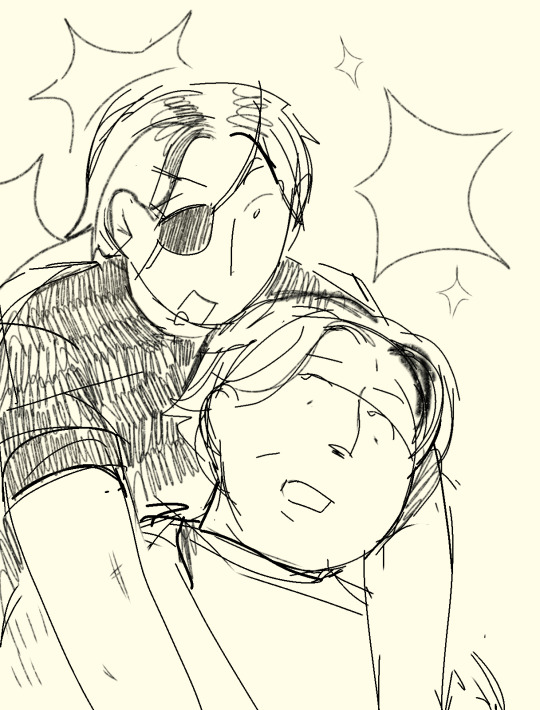
#Willow and Pierre have a “hyperactive silly son and tired of getting him out of trouble dad” kind of relationship.#despite some misunderstandings they still respect and help each other#Willow gives all sorts of things from sparkly cool rocks to goodies from the kitchen or hauling quality merchandise to the store to sell#and Pierre pulls him out of a cave on the edge of town for the millionth time and mends his wounds..#.. and most importantly he gives powerful support and motivation to live not to exist and rot from loneliness.#i love thinking about their strong relationship..#stardew valley#stardew valley art#stardew valley fanart#stardew#stardew art#stardew fanart#sdv#sdv art#sdv fanart#stardew valley pierre#stardew pierre#sdv pierre#pierre sdv#stardew valley farmer#sdv farmer#stardew farmer#stardew valley oc#sdv oc#art#artists on tumblr#vilka post#my art shit#farmer willow#omg I made a separate tag for him.
101 notes
·
View notes
Text
why we ship darklina
an essay literally no one asked for
Nobody needs a "reason" to ship Darklina. But considering this is a villain x hero pairing, it got me thinking about why we shipped it in the first place when the narrative and author so badly wanted us to root for the more sensible alternative pairing and why it became the most popular ship of the entire trilogy.
Personally, I find it really interesting (and low-key hilarious) that a lot of the reasons shippers gravitated towards Darklina can be directly traced back to how badly Bardugo bungled Alina's character arc, Mal's entire characterization and narrative role, Nikolai's wasted potential as an alternative love interest, and the noble intentions she gives the the Darkling.
Alina's Character Arc
Alina's character arc doesn't match who she is as a character. I've written more about that in this post, but a lot of readers were introduced to a passive and insecure protagonist who we were expecting to undergo a typical YA coming-of-age character arc where Alina acquires self-acceptance, confidence, and embraces the full breadth of her powers over the course of the trilogy. Instead, Bardugo gave Alina the kind of character arc that's usually deserved for power-hungry anti-heroines or tragic heroes with a fatal flaw to punish.
The plot offers a strange binary: either Alina suppresses and hides her powers and therefore stays away from descending into villainy OR Alina attempts to find Morozova's amplifiers in order to defeat the Darkling but then becomes corrupted by power in the process. Alina's journey to self-acceptance and exploring her own powers are unfortunately entangled with her relationship with the Darkling. The only way she is allowed to move forward through the plot is to succumb to the corrupting influence of the amplifiers.
For better or for worse, the first character to really embrace her powers instead of thinking she's a fraud or that she's weak or that she's an unholy abomination is the Darkling. He's the first person to recognize her power for what it is and accurately judge its potential and implications for the rest of the world. He advocates for her in front of the royal court, in front other Grisha who think she's weak, and even against Baghra who is initially a very ill-tempered mentor with little to no faith in Alina's abilities. He even rather ironically advocates for her even when the heroic person who's supposed to be supporting her (Mal) does not.
At the start of her journey, Alina is insecure and in constant need of assurance and validation. The Darkling's role as her mentor and guide into this unfamiliar world of Grisha makes him the perfect advocate not only for her powers but also to help Alina see her place in the world. However, once he is revealed to be the villain, Alina also fails to realize that it's time for her to advocate for herself and throws the baby out with the bathwater.
Mal's Characterization & Narrative Role
When Alina loses the Darkling as an advocate in S&B, Mal steps up to take this role. Alina is still rather passive for the majority of the first book and it's Mal who originally wants her to have Morozova's stag as an amplifier if it will mean being able to stand against the Darkling. Bardugo intended for him to be a heroic love interest as a foil to the villainous love interest and I believe she mostly succeeds for the first book.
However, because this is a story about punishing Alina's "evil ambition" (despite there being very little evidence of that) Mal is supposed to serve as a voice of reason in the narrative. Once Alina considers the necessity of acquiring more amplifiers to defeat the Darkling, it is Mal's role to warn her of the potential consequences, to remind her of her inner humanity, and to ward against the corrupting influence of Morozova's amplifiers. Mal's declarations that he wants back the old girl he knew without any power is meant to drive an ideological wedge between them, yes, but he's also meant to be Correct™ because, again, Bardugo is writing a story about a corrupted power-hungry heroine who goes too far and needs to be punished rather than the arc we were all expecting and the one that Alina's character needs: a coming-of-age story of self-acceptance and personal growth.
Some point after the backlash of Siege & Storm, Bardugo seems to have become aware of her mistake and attempts to scrub Mal's character to be more sympathetic. There is a bizarre exchange half-way through the third book when Mal finally declares:
"I wasn't afraid of you, Alina. I was afraid of losing you. The girl you were becoming didn't need me anymore, but she's who you were always meant to be."
This is an interesting line because it's a complete reversal of Mal's narrative role so far. He's supposed to be her voice of reason that opposes her at every turn but readers interpreted him as being resentful of Alina's powers and angry that she was no longer dependent on him. Bardugo is forced to retcon Mal's entire role in the narrative from being a voice of reason that opposes Alina's quest for power to a supportive friend who will fight by her side. But this was never her initial intention and I believe this change was brought on 100% by audience reaction because she failed to understand the arc her heroine needed and the kind of story her audience was anticipating for such a character.
Needless to say, having your heroine's main love interest actively resent her quest for power until half-way through the third damn book did not endear many readers to Mal. Because Bardugo failed to understand the kind of character development her heroine needed and failed to understand audience expectations, we hated Mal. He became the embodiment of every toxic chauvinist we'd ever met who can't stand the idea of his partner's success and feels entitled to be the center of her universe. He was not the voice of reason. He was an annoying gnat hellbent on dragging the heroine down and away from her destiny. We did not want to root for him. Even the villain was more sympathetic than him because he could bring her closer to achieving the self-acceptance the narrative was obsessed with denying her.
Nikolai's Wasted Potential as a Solid Love Interest
Nikolai plays several roles in Alina's journey but most importantly in our discussions for why we ended up shipping Darklina, his entire potential as a serious love interest is wasted.
When we meet Nikolai, we have hitched our wagons to the Darklina train because despite being the villain, the Darkling is the only one who will allow the heroine to accept her powers and come into her own. Her heroic love interest, Mal, is actively sabotaging her efforts and holding her back from her true potential. But then, in swoops Nikolai and we pause, wondering if there may be a better heroic alternative after all?
In a lot of ways, Nikolai and the Darkling alike: they are eager for Alina's power and see her as a solution to all their problems. They may want to use Alina to prop up their own agendas, but unlike Mal, Alina's summoning powers are a massive plus, not a burden. Nikolai is the heroic alternative to our villainous Aleksander. So we wait, wondering if Nikolai will be the one to fix this mess of a romantic subplot. His royal connections offer an easy path to upwards mobility for our heroine and we sense that an alliance between them (even if it's initially political in nature) may bring our heroine closer to obtaining more power, influence, and self-acceptance not only for herself, but also for the oppressed minority she is a part of.
But, again, Bardugo is still obsessed with that "punish the heroine for wanting power" agenda so while Nikolai exists as another mentor figure who offers Alina advice on how to rule, how to appeal to other people, how to charm, how to win people over, and Alina learns and applies much of what she learns from him, he is not treated as a real love interest.
Despite Nikolai being written as a fairy tale prince (handsome, charming, smart as a whip, brave in battle, etc) Alina never actually considers him romantically. They are friends and allies at best and the only time she considers kissing him is only when she's pissed about Mal.
Nikolai's proposal at the end of Ruin & Rising feels like one last saving grace, one last opportunity for our heroine to take control of her life and make a dramatic change to break from the past. But this too is rejected because Alina's arc will never let her access any power. She does not reject Nikolai because she wants to marry for love. She rejects him because she has been "punished" for wanting power and has internalized that she must not seek any more power for fear of angering the plot gods (and Bardugo). She must return to being nobody in order to remain a good and moral person.
(And, of course, we resent Mal even more because who in their right mind would choose him over Nikolai? Once again, he becomes a roadblock on our heroine's journey to power. We grow irritated that the heroine is failing to grasp an opportunity to elevate herself. We throw the book against the wall. Why are we even following this heroine?)
The Darkling's Motivations
Still, all of the above might still not have been enough to pull the reader to the villain's side. But the Darkling is the living embodiment of Villain Has A Point™. He is not pure unadulterated evil. He is not Lord Sauron or Voldemort or the Terminator.
He's more Magneto, Roy Batty, or Ozymandias---a man who is part of an oppressed minority who longs for justice and power but is absolutely unhinged in his methods.
Alina runs away because she does not want to be a non-consenting weapon in hands. But we always end up wondering what would have happened had Baghra not warned her. What would have happened if Alina gladly joined the Darkling's side? There's hundreds of fanfics written precisely about this situation because despite the villainy of his methods, we wonder if Ravka might not have been safer after all?
If the Darkling had used the Fold as a weapon against Fjerda and Shu Han, would any of the problems Ravka faces in the later books even exist? Would any Grisha fall victim to the khergud programs or be killed as witches? The Darkling wipes out Novokribirsk and kills hundreds of lives, but how many would he have saved with the Fold as Ravka's greatest shield and sword? 🤷🏽♀️
And therein lies the problem with the trilogy inconsistent moral landscape. The Darkling is an anti-villain that exists in a narrative that is very black and white, unlike the rest of the books in the Grishaverse where our protagonists are anti-heroes who kill, steal, and torture their way through the plot with nary a judgmental glance from the narrative. We long to see our heroine give in to her dark side and get her hands dirty because watching a naive, passive, scared little girl grow into a ruthless powerful Grisha would have made for a hell of a compelling story.
But that's not the story Bardugo wanted to tell.
The Greg Trilogy
Despite taking place in a fantasy Tsartist setting, the Grisha trilogy is oddly anti-Grisha. The narrative doesn't spend much time trying to examine the context or implications of an oppressed minority group fighting for power other than to say "magic powers = evil". Nikolai skates by on a throne of inherited wealth, privilege, and imperialism but it's okay because he's charming and witty and the only monstrous part of him is the Darkling's curse. Literally everything is worse for Ravka and their Grisha after the destruction of the Fold but Ravka must move forward into a new age without relying on Grisha power but putting their efforts into new muggle technologies. Alina must be stripped of her powers and returned to her "old self" in order to be purged of evil.
Basically, it's all one gigantic ✨ dumpster fire ✨ of mismatched character arcs, incompatible moral aesops, inconsistent characterizations, wasted potential, unexamined plot points but it's a a dumpster fire we lovingly and spitefully embrace in fanfic.
We don't ship Alina with the Darkling because we're stupid abuse apologists who somehow missed the giant flashing moral aesop of the books---and honestly, who could have possibly missed them when it's shoved in the reader's face every other chapter? We ship Alina with the Darkling because the entire ship is the embodiment of wasted potential (and wasted ✨aesthetics✨ tbqh 👀). We ship Alina with the Darkling because we're sick and tired of stories where female power is demonized. We ship Alina with the Darkling because the plot gave us literally no other alternative to see our heroine succeed except to give in to her alleged villainy.
But most of all, people ship Darklina because Leigh Bardugo utterly failed in writing the story she intended to write because had she succeeded, Darklina would not be the most popular ship of the trilogy.
#darklina#sab meta#grisha meta#grisha discourse#wow im embarrassed by how fucking long this is#but you know i had to write it#anti leigh bardugo#its not really anti so much as it is just pointing out why her story flopped for a lot of readers#alarkling#viv metas
618 notes
·
View notes
Text
A POWERFUL HABIT
Or, How a Scene from Unleashed Completed the Transformation of Alan Deaton from a Magical Negro Stereotype into a Real Character and One of the Better Adult Characters on the Show: A Meta for Day 3 of Teen Wolf Meta Week: Close Reading.
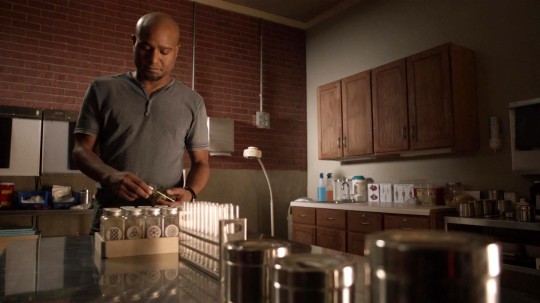
When Stiles Stilinski confronts Alan Deaton in his clinic during the fourth episode of the third season, it's serves multiple purposes. It gives us the exposition we need to understand the powers and abilities of the Darach (who will be revealed as Jennnifer Blake/Julia Baccari later in the season), it reinforces Stiles's role as investigator and goad among the cast of characters, and -- most importantly in my opinion -- fundamentally clarifies not only Alan Deaton's motivations but also gives him the necessary depth for a minor character.
Spike Lee was a major critic of the harmful 'Magical Negro' stereotype that has shown up in media, and he's where I first heard the term. It refers to a black character who possesses deep wisdom and magical powers but seems to only exist to provide other characters (almost always white) with mentorship and assistance, only to fade into the background when their assistance was no longer necessary. They had no motivation beyond helping and they really have no well-defined point of view of their own. Any conflict in which they were involved was external to them. In terms of narrative, they served to move the plot along and that was about it.
In Season One, we're introduced to Deaton as Scott's boss, who is supportive of Scott as a teen-age boy, but he is drawn into the supernatural adventure because Deaton was used by Peter to lure Laura back from New York, suspected wrongly of being the alpha by Derek and Stiles, mysteriously managed to save Scott from dying in the woods after he had been shot by hunters stopping Derek from killing Jackson, and defended Scott from Peter, which coincidentally introduced us to mountain ash. At this point, he's still firmly within the stereotype.
In Season Two, Deaton's role as a source of information, wise advice, and unexpected help continues, but we get our first hint of depth when we learn that he was a friend to both Laura and Talia. But his character begins to deepen with the antagonism (and a little bit of fear) he shows Gerard Argent and the scenes with his sister, Morrell, which implies that he has withdrawn from such things, but also lets us know that his involvement wasn't incidental but purposeful.
It's not until Unleashed, and his scene with Stiles that his actions are given full context. Why does he know so much about werewolves and the supernatural? Why is he not forthcoming and open with his advice? Why does he use such circuitous ways to help Scott, the lead protagonist?
We open on the scene of dogs barking at the clinic and Deaton comes out of the backroom into the lobby to find Stiles waiting for him.
Deaton: You're out of school early.
It is telling that Deaton's first observation is that Stiles has left school. This isn't a throw-away line. Deaton sees Scott and his pack first and foremost as teenagers who, as he will say in a later season, have their own lives of which they have to take care.
Stiles: Yeah, free period, actually. Um, I was just headed home to see my dad. He's, uh... you know, I guess you probably heard people are kind of getting murdered again. It's his job to figure it out.
Stiles is not just telling Deaton or the audience what we already know, he's setting Deaton up for interrogation by setting the stakes. There are people dying.
Deaton: I gathered as much from the sheriff title.
Deaton is not just being sassy here. Just as Lydia points out earlier in the episode, this isn't really Stiles's responsibility. For Deaton, there's a line between adult and child. Stiles is a high-school junior and this is a murder case. While Teen Wolf had to keep Scott and his friends involved in the action, they managed to sometimes point out that this was a voluntary action with consequences.
Stiles: Yeah, um... You know, but it gets kind of hard for him to do his job when he doesn't have all the information. And we all know he's missing pretty much half the story here, right? So then I started thinking, and I remembered someone who does have a lot of information. Someone who always seems to know more than anyone else around here. You.
Here is the confrontation. Deaton knows things, and as Chris Argent said last season to Allison, "what we know makes us responsible." Stiles is recruiting assistance by pointing out Deaton's responsibility. Deaton doesn't like this by the expression on his face, but he's not angry. Instead, he leads Stiles back into the examination room.
One thing to observe is that the examination room is Deaton's sanctum. When he invites people back, it's a sign of trust. When people come in without an invitation (like Derek in Season 1, Jennifer in Season 3A, the oni in Season 3B, and Theo in Season 5A) it's always a violation. Deaton is not treating Stiles as an enemy here.
Stiles: All these symbols and things... the triskeles, the bank logo, the Mountain ash... all of it is from the Celtic druids. And anyone who has ever looked up human sacrifice before knows that the druids had a pretty big hard-on when it came to giving one up to the gods. You ever hear of the Lindow man? 2,000-year-old body found in England? He was found strangled, head bashed in, throat cut. Threefold death. They also found pollen grains in his stomach. Guess what favorite druid plant that was.
While Stiles is laying out his case for the sacrificial killings to Deaton (and cleverly giving the audience background for what's happening), the veterinarian pulls out a plant, acknowledging Stiles's observations as true and his accusation as just. Deaton does know more.
Deaton: Mistletoe.
Deaton is regretful in this scene. He's caught. He doesn't want to be involved (and he doesn't want Scott and Scott's pack involved) but Stiles has cornered him and he can't evade any more.
Stiles: I'm just telling you everything you already know, aren't I? Then why aren't you telling us?
And this is where the stereotype is expressed and demolished. Because if Deaton was to remain a Magical Negro stereotype, he would give an answer that's about Scott and his pack. His motivation for his behavior would be something about protecting them or teaching them to think for themselves or some mystical requirement. (As a digression, Deaton does mentor not dictate, which is a powerful way to lead people into growth, but this scene shows it's more than that.) But it's not.
Deaton: Maybe because when you’ve spent every moment of the last ten years trying to push something away. Denying it. Lying about it. Becomes a pretty powerful habit.
BAM! Now Deaton is a real person and not just a prop to move the plot along. He hurts. He has regrets. He has fear. He has protected himself from the past and from the future, and maybe he hasn't done it in the best way. He's aware of this. He's still a trained druid and he can help ("Whoever said I was retired?") but there's part of him that doesn't want to. There's part of him that only wants to mentor Scott in how to give dogs injections, because his last involvement with the supernatural world ended in fire and death.
Stiles: All right, so this guy... is he a druid?
Stiles immediately figures it out, because he always figures it out. He understands fundamentally what Deaton means, he connects it to the Hale fire, he shares the feelings behind it. (In the future, we will see that explored in excruciating detail in Required Reading, 5x06) So, he does what he would do if it was him being caught: he changes the subject.
Deaton: No. It's someone copying a centuries-old practice of a people who should have known better. Do you know what the word "druid" means in Gaelic?
But it's too late. Stiles has made his point, and Deaton admits that. Deaton is one of those "people who should have known better." He shouldn't have tried to hide from what is going on and what this means for himself and for Scott and Derek and the other people for which he cares.
Stiles: No.
Deaton: "Wise oak." The Celtic druids were close to nature. They believed they kept it in balance. They were philosophers and scholars. They weren't serial killers.
Deaton is telling Stiles who he is and this is what he does. He is saying that the killer is not what Deaton is, which is why he felt he didn't have to get involved. But he was wrong, as Stiles pointed out because part of his belief system is action: "they believe they kept it in balance." It's why in a later scene, he'll be stricken when he realizes due to Harris's warning that it is indeed a Darach -- a druid who has left the path (just like Stiles made him realize he had done).
Stiles: Yeah, well, this one is.
In this moment of prescience, Stiles places Jennifer as Deaton's antithesis and foil. And she is. Both of them teach. Both of them have suffered loss. Both of them are more than they appear to be at first. Both of them are knowledgeable and that gives them power, especially in terms of ritual sacrifice. And both of them have been deceiving themselves about what they're doing, but it will be Scott who confronts Jennifer rather than Stiles. "You see this symbol? It's a symbol of revenge. You talk about balance, about saving people. We know what you really want."
This scene, taken into context of the greater show, sets the stage for Jennifer and for Deaton's role in stopping her and becoming, once again, an Emissary for an alpha he loves and admires. But right here, it serves to give Deaton depth as real character. He's not just a mystical vending machine, dispensing aid and advice. He's a person who has boundaries, regrets, a history. I wish we had gotten more of it.
69 notes
·
View notes
Text
The overarching themes of Vanitas no Carte: Identity
The Case Study of Vanitas is a very good, too little known manga (I hope the anime changes something), with some central themes than are exposed in different ways through different characters. In this meta, I want to explore one that was brought to my attention pretty recently: here a little examination on the various ways to face one's own identity in The Case Study of Vanitas.
The Stable Identity( Noè)
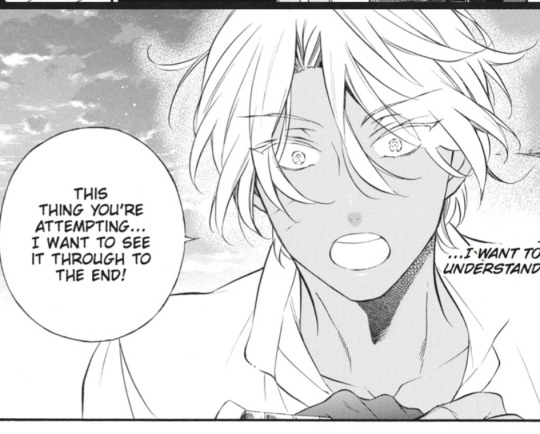
Let's start off with the positives, shall we? Noè has probably the most secure personal identity of all the bunch.
And this is pretty amazing, considering everything he went through. He has no memory of his birth family, but gets adopted by some nice people - who die shortly afterwards. Right at their graves, he is kidnapped by slaves, in an accident that left him injured. Then he is bought by someone who actually treats him nicely and is a good mentor for him, he finds many friends his age - and then one of them, the one he was closest to, turns out to be a cursebearer, kills all of the others and then tries to kill him; he is saved by the mentor, who beheads the friend right in front of him. The most immediate emotion is relief for being alive, and he will always feel terrible for that. Then, he has to witness his surviving friend try to cope very badly with her mourning by repressing her identity and try to substitute it with that of her dead twin. That's a lot.
And Noé reacted to all of this by becoming a confident person, kind and attentive to others, but not to the point of being a pushover. I'm not saying he walked away unscathed from the events of his childhood: he regrets the way he handled things with Louis, the way he didn't understand him, and has developed quite the savior complex as a result.
What I'm saying is that he is probably one of the very few well-adjusted people in the psychiatric ward that is Vanitas no Carte. He is still questioning himself, but in a normal way for a nineteen-years-old that has just left a sheltered environment for the big wide world. He is aware of some of his strenghts (his naivete) and is realizing others (putting unfair expectations on other people, underestimating other people due to racial biases); but most importantly, when he realizes these mistakes, he doesn't run away from them or obsess over them believing they make him a horrible person: he recognizes them, apologizes to the wronged person if necessary, and works on improving them.
This isn't to say he's completely happy-go-lucky with no regrets; he feels guilty about being relieved that he lived while Louis died, and he has a lot of uncertainties regarding his identity as an Archiviste and the impact his powers can have on other people. But he managed not to tie his entire identity to that guilt; and as for the second point, Teacher helped him rationalise that and figure out a conduit that didn't undermine him and at the same time showed respect for others. Noè went through several traumas, but received one thing most of the cast didn't: guidance and support from his environment. Whatever Teacher's actual motives are, he shaped a well-balanced person.
The Group Identity (The dhamps, appearently 99% of vampirekind)
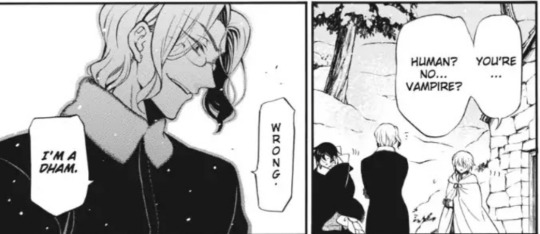
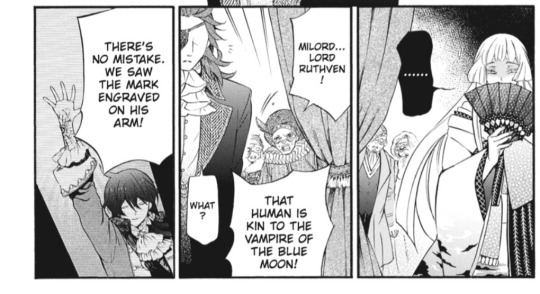
"Us dhams are only loyal to each other!" This is what Dante says in one of the first chapters, giving us the first clues to their status as outcasts.
The war between humans and vampires ended up with each deciding to keep to themselves, but dhampires are the living exception to that silent agreement. So, both societies decide to reject them, and they can't find a place in the world unless they stick to others of their own kind. This common history of traumatic experiences of abandonment and subsequent resentment of both human and vampire society for it goes on to create a very strong group identity: the only ones they give a damn about are those like them, everyone else is a potential enemy and is only good to be exploited.
Then, we have the vampire culture. I mean ... it might be because insofar we have met almost exclusively aristocrats obsessed with their respectability ... but they have a lot of prejudices.
You're born under a uncommon moon? You're a pariah. You're mixed race? You're a pariah. Your parents committed a crime? You're a pariah, and are used as a tool. You're born as part of a set of twins? Either you or your sibling are killed at birth, because of something that is SAID, not even a certified element of vampire biology. You're stuck with a curse? You're executed, no attempts to heal you.
Their society seems to run on an ideal model of person which depends on factors outside the individual's control, and whoever doesn't fit this description and deviates from the group in any shape or form gets ridiculously fierce punishment. They make the freaking Church look good by comparison, at least their repressive and racist side is composed of extremists instead of everymen.
The Clan Identity (Chloé, and partially Noé again)
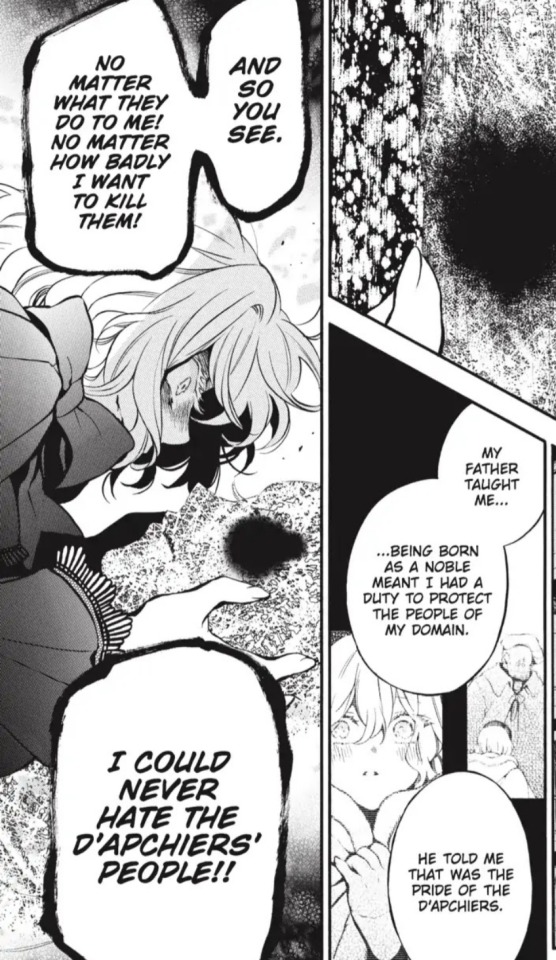
Chloé identifies with a group of people too; but it's not a race, it's a family. The D'Apchier family, the nobles who are responsible for Gevaudan. Her father made sure she had this idea in her right from the start, and she interiorized it.
And this had mixed results: while on the one hand she was chained to self-loathing by the guilt of having accidentally caused the massacre of the family and was only saved by Jeanne and Jean-Jacques reclaiming her as part of theirs, on the other she was able to resist to Naenia because of the love and responsibility she felt towards the people of Gevaudan. Chloé is, at this point, the only curse-bearer who managed to trick and attempted to fight directly against Charlatan.
Then there is Noé in relation to his Archiviste identity. He seems to think of it mainly in negative terms, very conscious of the living invasion of privacy it turns him into ... and nothing else. We have never seen him wonder about who his birth parents were, ask himself why he doesn't remember anything, why was the clan exterminated, or how he feels about being a survivor, one of the only ones if not outright the only. He sees his heritage as a burden,and hasn't thought of it in any different term. I wonder how a change in perspective could impact the above 'stable identity'.
The Someone Else's Identity (Vanitas, Dominique)
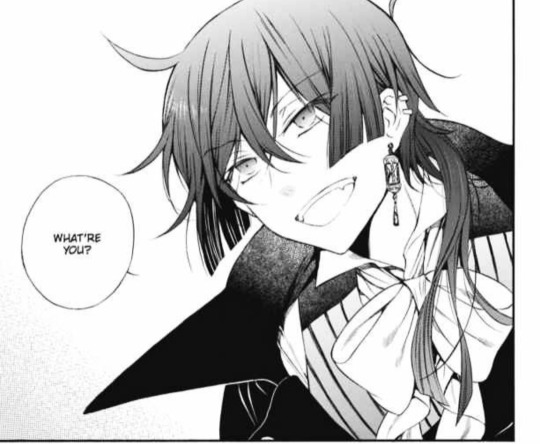
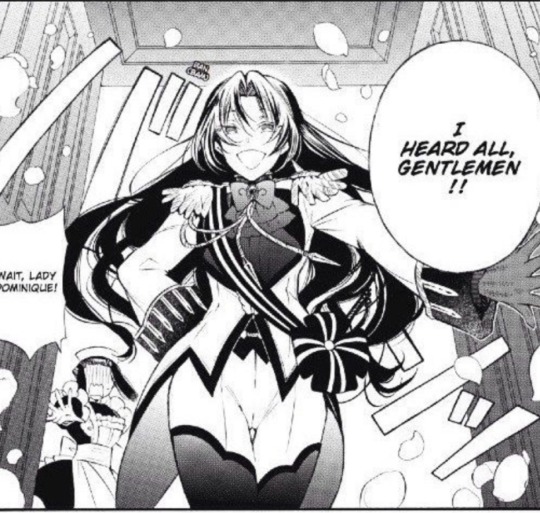
I already dedicated a whole post to this trait they share, so I'll be short: both Vanitas and Dominique hate themselves and try to become something worthy by taking elements of people they admire: Louis for Dominique, a combination of his birth father and Luna for Vanitas.
The Object Identity (Jeanne)
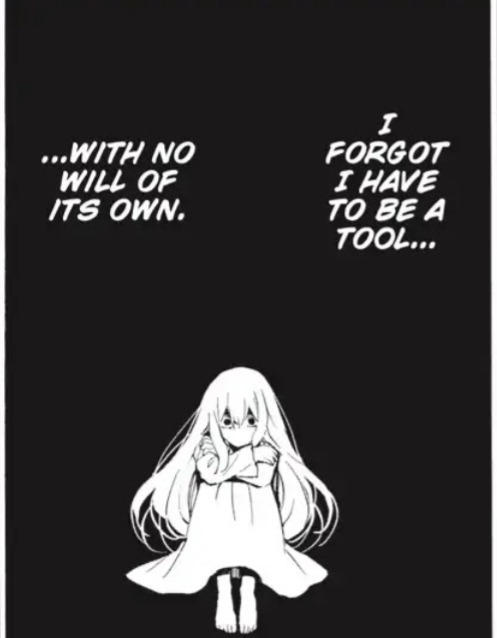
The very first thing Jeanne was said in her whole life was that she was an object. A vessel for something (or someone?) else, who mustn't have feelings or desires of her own. Encouraging, isn't it?
Luckily, this wasn't all she got in life. Soon afterwards, she was adopted by Eric and Louise, who loved her a lot, received kindness by Ruthven, met Chloé who became an older sister to her. Unluckily, all of this was taken away from her in the most cruel way possible.
She couldn't make any sense of her parents's betrayal and death, and the way her life suddenly changed; she rationalised it by telling herself that it was her fault, if she had been just the good object everyone told her to be nothing would have happened. So she accepts the Object Identity: she is a tool, so she doesn't feel, she exists only to obey orders, and as long as she is nobody else will ever suffer. It gets even worse after she fails to kill Chloè: she couldn't fulfill her duties, and both her and her big sis suffered for it. This mindset traps her in a world of pain, but also prevents her from facing the fact that she is subject to a senseless injustice, one she has no control over.
Vanitas managed to help her with that. He validated her feelings, and showed her that nobody had to die if she had them, solving the situation with Chloé and Jean-Jacques. This gave her a nice confidence boost, returning her to the cheerful attitude she had as a young girl; the consequences of this change remain to be seen.
The Unknown Identity (Luna)
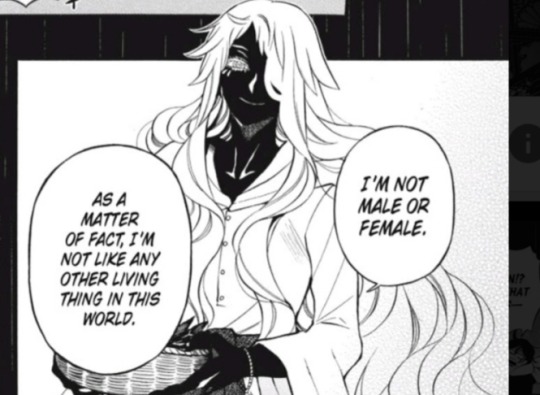
This one is interesting because Luna themselves is pretty explicit about it. They see themselves as something 'other', who is outside commonly used categorization; starting with 'male or female' (and here I am left wondering if they had specific sexual characteristics but didn't feel like they 'fit', or were intersex and nonbinary, or had an entirely different biology from both vampires and humans).
Luna doesn't like this condition: they said they tried to figure out what they were, to understand themselves, and they regret doing so now. Why? Maybe they didn't find any answer and were left perpetually unsatisfied, or they found an answer, and they found it to be awful?
Still, this indicates Luna has never been particularly happy with themselves, and this found no resolution. And then they died. Nice, uh?
Well, I think this was all. There are other characters I would like to know more about in regard to this, like Ruthven, Marquis Machina, and Mikhail, but there is still time.
All in all, I'd say Vanitas no Carte explores the theme of identity pretty throughly; many character arcs are still in progress, and I'm interested about how things will develope especially for Vanitas, Dominique and Jeanne.
Thanks to anyone who bothered to read my ramblings!
#vnc#vanitas no carte#the case study of vanitas#vnc meta#vnc analysis#vnc noe#vnc chloé#vnc vanitas#vnc dominique#vnc jeanne#vnc luna#elia's recaps
263 notes
·
View notes
Text
On the Legendary Wolves’ Plot in Pokéspe SWSH
I really like the way the legendary wolves’ plot is being handled in Pokespe so far. They’ve made a handful of changes and additions to the plot as it’s presented in the games that make it feel integral to the main characters and the overarching story, as well as just being more interesting to follow.
Part of the reason why this plotline is weak in the games is because it’s presented as just a minor subplot. You occasionally get more information about what really happened as you progress through the game, but it doesn’t seem important for you to pay attention to it until you get to the climax and Rose reveals that he’s caused the Darkest Day. Even though you encounter Zacian or Zamazenta in the Slumbering Weald at the beginning of the game, it’s not until Circhester that Hop connects that encounter to the legend you’re unraveling. And in the grand scheme of things, all that encounter does is confirm that the sword and shield Pokémon live in the Slumbering Weald - which Sonia apparently also learns about in a book that mentions Zacian and Zamazenta by name. So, why was it necessary, again?
But right out of the gate, Spe immediately ties the legendary wolves into the main characters’ backstory and motivations. A year prior to the beginning of the chapter, Sou goes to the Slumbering Weald to try to find the Rusted Sword and Rusted Shield. He knows about them – and has an interest in them – because he’s from a family of swordsmiths, and he wants to see genuine, historical pieces of armor in person. Meanwhile, Schilly goes to the Weald to look for a Wishing Star that she had seen falling, since she wants to get it made into a Dynamax Band. The pair encounter the illusory Zacian and Zamazenta, and Sou immediately comes to the conclusion that these two are here to protect the Rusted Sword and Rusted Shield – a conclusion supported by the fact that when they walk through the illusions to try to take a look at the artifacts, they’re knocked out by a flash of light. When they awaken, the Rusted Sword and Rusted Shield are gone - as are all of Schilly’s Pokémon. Sou decides to start traveling with Schilly because he feels partly responsible for her Pokémon going missing, and Schilly decides to compete in the Gym Challenge to spread the word about her missing Pokémon and make it easier for her to find them. Additionally, it’s later revealed that Sou decided to participate in the Gym Challenge so he can get stronger and challenge Zacian and Zamazenta to a battle, believing that they’ll only allow someone with skill as a Trainer and an earnest desire to see the Rusted Sword and Rusted Shield to see the artifacts in person.
So, in short, the reason why Sou and Schilly met and their respective reasons for taking on the Gym Challenge are both intrinsically linked to their encounter with the legendary wolves. This makes the wolves’ presence relevant throughout the whole story, ensuring that the reader doesn’t forget about the encounter by the time it becomes relevant again. (I also appreciate that they gave the wolves a concrete reason to appear before the protags in the Weald, something which the games and anime never really bothered to provide.)
Additionally, the decision to introduce the Rusted Sword and Rusted Shield right away instead of saving their introduction for the climax like what happens in the games was a really smart choice. First, it ties directly into Sou’s interests, giving him a good reason to be interested in the Rusted Sword and Rusted Shield as well as the other legends involving swords and shields. Second, it allows the characters to link together the encounter with Zacian and Zamazenta to the information they’re learning about the legends - Sou observes that the sword and shield held by the statue of the hero in Motostoke as well as the sword and shield depicted on the Hammerlocke tapestries resemble the Rusted Sword and Rusted Shield, suggesting that the legends have a connection to the artifacts. And when I say “suggesting”, I don’t just mean in the sense that it’s something you can interpolate from the text. I mean that Sou literally says, “It’s not entirely unlikely that the three are all the same,” and Raihan brings up later that if they’re the same sword and shield, the legendary wolves may be connected to these events in some way as well.
This is another thing that I really appreciate about the way that Pokéspe is handling this plotline: the characters actually speculate, hypothesize, and draw conclusions about the evidence that they’re being presented with. In the games, most of the encounters with Sonia just involve you pointing out incredibly obvious things about the historical artifact/legend, and Sonia agreeing that they’re significant. She asks a lot of questions, but doesn’t postulate answers to them unless they’re directly being shown to you. And even some of the conclusions she draws seem like leaps of logic, like when she assumes that the statue behind the Stow-on-Side mural must be correct because it was made in “truly ancient times” - like, we just discovered this statue, Sonia. We have no idea how old it is.
But in Spe, the characters draw logical conclusions from the information they have, which means they can figure things out a lot faster than they do in the games and makes the conversation interesting to read whenever they learn new information. For example, Sou speculates that the sword and shield wielded by the hero might’ve had special powers, which is true. How did he figure this out? He explains that he thought about it because the hero used them to fight giant, rampaging Pokémon, which is a bit difficult to accomplish with a normal sword and shield.
Another great example of this is in Hammerlocke vault, when Sou guesses that Chairman Rose wants to cause the Darkest Day. One might think that he’s figuring things out way too quickly, but the thing is, this conclusion makes perfect sense given the information he has. While looking at the tapestries, Sou notices that the first one depicts a Wishing Star falling and the second one depicts the Darkest Day occurring. Thus, he guesses that Wishing Stars might have caused the Darkest Day, a hypothesis that Sonia agrees with because they’ve already figured out that the Darkest Day has a connection to Dynamaxing, and Wishing Stars cause Dynamaxing. But Sou had previously learned from Bede that Chairman Rose is collecting a massive amount of Wishing Stars, so it’s only natural that his next thought would be to wonder if Chairman Rose is - advertently or inadvertently - going to cause the Darkest Day again. This immediately ties the Rose plot in with the legendary wolves’ plot, a connection that doesn’t start to be made until your third visit to Hammerlocke in the games.
In general, the Hammerlocke vault scene is way better in Spe than it is in the games, where all you get is Sonia saying that the disaster depicted is probably the Darkest Day and wondering if there was one hero or two. Besides the conclusions that I already mentioned, Sonia also connects the disaster shown in the tapestries to the disaster shown in the Turffield geoglyph, concluding that they’re both depictions of the Darkest Day. However, Sou points out the lack of giant Pokémon in the tapestries, which are always associated with the Darkest Day. I really like how they point out both the similarities and the differing details between the stories, which makes it a little more understandable why no one has ever put together that this myth of the creation of Galar and the legend of the Darkest Day might be referring to the same event.
Finally, the last major improvement that I want to talk about is the one that was introduced in the latest chapter: an explanation for why the legendary wolves’ existence was lost from the legends. The destruction of the Stow-on-Side mural happens offscreen in this story, which is kind of understandable - the main significance of this statue in the games was to introduce the concept of Pokémon being involved in the legend, which Sou, Sonia, and Raihan had already figured out. This statue holds a completely different significance here: when Sonia is telling the protagonists about the newly discovered ruins, she says that she thinks the mural was put up by someone who wanted to deliberately hide the two Pokémon from the legend, giving all the credit to the humans. She points out the tapestry at Bob’s Your Uncle as further proof of this, which - given its condition - looks like someone threw it away so it would disappear from history.
I don’t believe that the games ever explain how the tapestry ended up in the restaurant, so the fact that it’s given any sort of context here is really neat. But more importantly than that, it’s really interesting that they’re stating outright that the legendary wolves were deliberately removed from the legend. In the games, Sonia wonders why the ruins at Stow-on-Side would be hidden, but doesn’t offer an explanation - she doesn’t even say anything to suggest that it was done intentionally. The question is never brought up again. So I’m really hoping that Spe won’t go that route, and this revelation will have broader implications in the story next chapter or even later - that we’re going to find out who covered it up, or possibly that someone in the present day knows about the cover-up and is willingly propagating it. The immediate assumption is that it’ll be connected to Sordward and Shielbert in some way, since they benefit from the legend being that their ancestors were the heroes who saved Galar. But I think it could also be interesting if we find out that Rose knew about the statue and is deliberately trying to keep the existence of the sword and shield Pokémon covered up - it’d make a lot of sense why he was so unforgiving to Bede for trying to destroy the mural if that were true. Either way, I’m excited to see where they take this concept.
tl;dr The way Pokéspe has been handling the plot points related to the legendary wolves has been really good so far, much better than it was in the games, and I’m very excited to see how it develops going forward!
#pokespe#pokemon special#swsh chapter#analysis#trainer sonia#trainer sou#trainer soudo#zacian#zamazenta#i spent way too long on this#please read and appreciate it#also it has given me a much greater appreciation for sou as a character#he's at his best when history is involved tbh
115 notes
·
View notes
Text
Love Breathing Not Fully Bloomed: A Kanroji Mitsuri Meta
Some thoughts that have been brewing since we got a deeper look at the birth of the Breath of Love in the Rengoku Gaiden, boiling down to that Mitsuri had not yet reached her full potential.
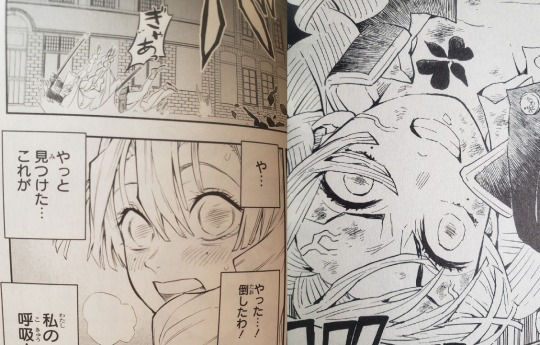
SPOILERS AHEAD~!
While we don't have any reliable timeline for this series, we know that Mitsuri has been practicing swordsmanship for only about two years, likely less.
The "two years ago" stated in her flashback to her failed engagement was back when she was 17, so let's be generous and say that was 2.5 years ago. But, we must also keep in mind that she's been a Pillar for at least several months by the time Swordsmith Village arc takes place. The Pillar meeting Tanjiro met her at was possibly her first of the twice-a-year meetings, but I wouldn't put it anywhere beyond her second.
After the failed marriage discussion she would have spent some unknown period of time dying her hair and starving herself, before deciding to join the Demon Slayers. She accomplished her Flame Breathing training under Rengoku in six months, roughly half the time most Breath users train under their cultivators. Tokito is noted for becoming a Pillar in two months after taking up the sword, but Mitsuri probably stumbled her way into Pillarhood within months of passing the Final Selection; making the Kamaboko squad's quick ascension up the ranks look like nothing as she blows away the usual five years it takes someone to become a Pillar (or if they are especially skilled, more like two years, as stated by Gotouge in Taisho Secrets).
While the way of swordsmanship and battle became Mitsuri’s everyday way of life, thereby leading to huge improvements, that's a really short time to develop actual battlefield experience. Among the Pillars, she is the least seasoned or naturally inclined for battle, it really is by accident of her bizarre strength that she’s gotten so far.
That's hardly surprising, given her background and motives. For context, her interests are very domestic what with all the pet-keeping (four cats, a rabbit, and a whole hive of bees, by my count) and sweets and recipes, and her stated hometown would have been in the heart of developing city culture, with shopping and restaurants and movie theaters. There would have been no exposure to swords and the culture that goes with them, making her justifiably embarrassed of how monstrously her strength makes her stick out. Her inability to fit into a normal family life makes her feel worthless, even if she does have a base of love and support. (*Put a pin in these things, I'll be drawing a comparison to another character later.*)
However it was that she was introduced to the Corp, it must have taken a huge leap of hope and/or desperation to leave the otherwise comfortable lifestyle for a life of battle. While Rengoku's home is not terribly far from hers, it still would have been a total break from the life she knew before, so she must had been betting everything on both her ultimate wishes; living in accordance with who she is, and finding a husband. Let's refer to these respectively as Wish A and Wish B. Note that "becoming a strong swordsman" and "elimating demons" are not among these goals; they are merely means to her goals.
Now if we try to to follow her path as a swordsman chronologically, six months since taking up the sword under Rengoku, she's passed the Final Selection. On a mission with Rengoku, who now treats her as a peer, she's nonetheless filled with shame that she hasn't really picked up much skill and just waves her sword around with brute strength.
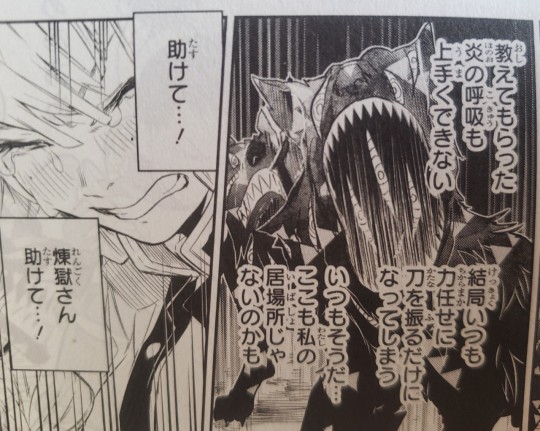
I love this bit of characterization because that is so, so easy a trap to fall into with martial arts. Even if you understand things in theory and do your best on proper form when taking things slowly, all of that very easily goes out the window when you're using them in the heat of the moment. The less experience you have, the far more likely one is to do this. Falling back on just throwing a punch as hard as you can instead of throwing a good punch makes Mitsuri so, so, so relatable. She is a normal girl with abnormal strength, not a battle genius. Like us normal people, and even like Tanjiro, she can only improve her battle sense with experience.
This puts her in a very different situation than the other Pillars, who she meets either when they are very experienced, or when they are outright geniuses. This gives her a different sense of shame, which we'll come back to.
While feeling ashamed that she can't live up to Rengoku's teaching, her fighting suffers with this lack of self-confidence (which, again, makes her very relatable because this is applicable to just about all of us normal people), and she only realizes the Breath technique when applying it through her own unique emotion-driven fighting style. While she goes on to name this Breath after Wish B (given that this is a romantic version of "Love"), it's powered more by a philanthropic love, realized only when she is protecting other people. This becomes a newly discovered third wish, as well as a source of confidence.
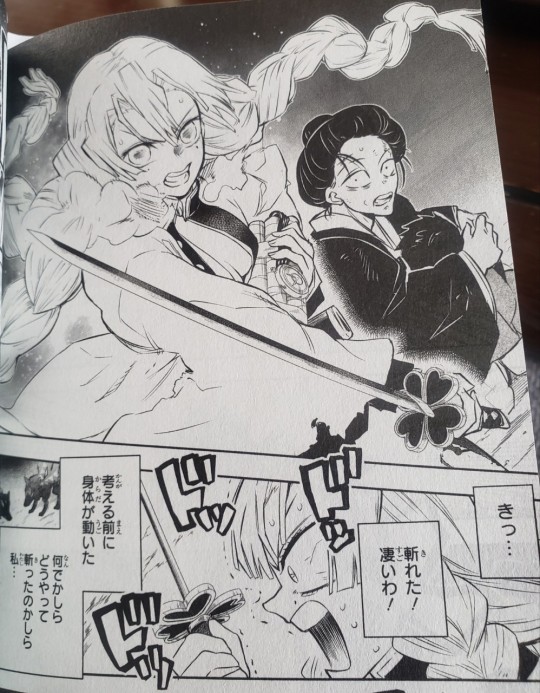
In the side story novels, Mitsuri later on suffers another blow to her confidence which compromises her fighting and makes her fall back into wanting to hide herself, for she is ashamed of how her motives compare to Shinobu's. Besides Shinobu's encouragement and giving Mitsuri a venue in which to openly express her love and appreciation for other people, another child whom Mitsuri has rescued looks up to her and says a few things to restore her confidence. Getting that feedback and being able to express herself openly (Wish A) is the cycle that powers Mitsuri's confidence and keeps her ultimate weakness, shame, at bay.
This, combined with words of encouragement from Ubuyashiki and Rengoku, is what really empowers her to embrace her unusual constitution and develop the Breath of Love. While it's said that this is an offshoot of the Flame Breathing she's formally trained in, it's more of a stretch than the relationship between something like Snake Breathing stemming from Water Breathing, and more like she's hit at the basis of Breathing itself to create a technique suited to her, like Inosuke did with his entirely self-taught Beast Breathing. (*Put a pin in this self-created Breath style thing, we're going to come back to this too.*)
So, Mitsuri went on to become the Love Pillar. With the rate at which Pillars cycle in and out (based on how many the Upper Moons claim to have killed), I have to wonder how fast the Lower Moons getting cycled in and out too. Even though these are her peers and we never see any other Pillars looking down on her, she sees herself in a lower position than the rest of them. Case in point, one thing I love that the anime did is that when Tokito chips the rock at Tanjiro and tells him off, Mitsuri is silently fangirling, and then when Tokito orders the Kakushi to draw back/leave, Mitsuri silently and automatically obeys and shrinks back. That wasn’t directed at you, silly!

Though her Breath requires confidence, she still has a ways to go.
When we see her again later, she's in a position of being a protector to everyone around her; the swordsmiths and her juniors, and she's treated with the awe and respect and acceptance of a Pillar; in this kind of setting she is fully in accord with Wish A (reinforced by her less formal third wish) and, thanks to Shinobu's encouragement, not ashamed of Wish B, thereby eliminating a big part of her shame-based weakness. She's added all this power and just as importantly, experience to her preexisting raw strength and flexibility.
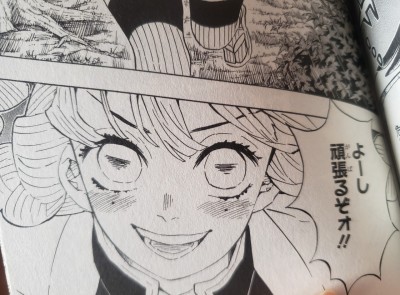
The experience is key here; she's gained a lot of battle sense since her first mission. She's not as taken off guard by demon abilities, and with her risen confidence, she's also gained more flexible thinking and can make quick adjustments in battle as needed.
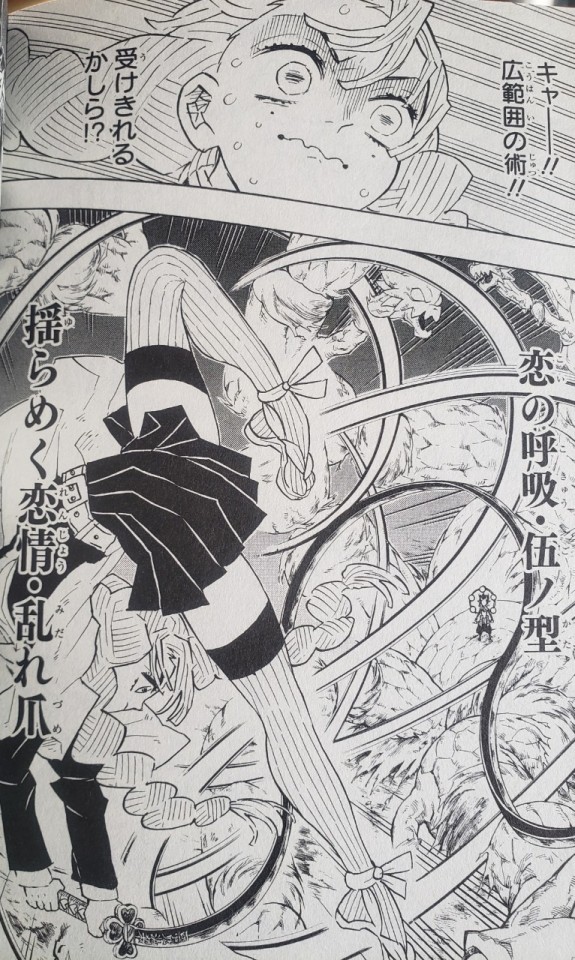
Not entirely, though. At her core, she still relies on that brute strength.
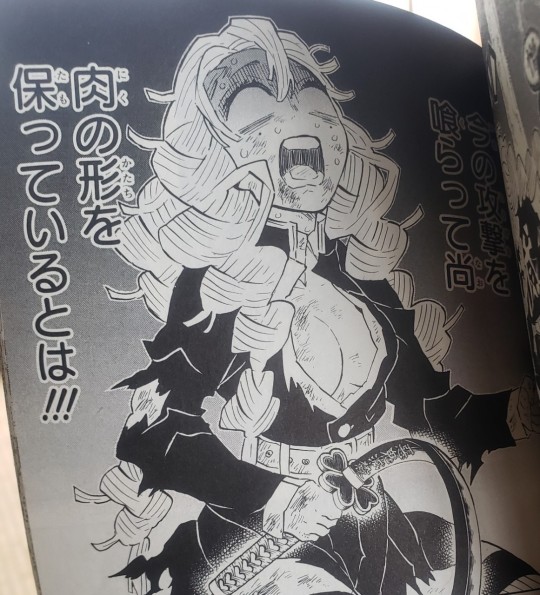
Ultimately, though toward the end she thinks she might be overpowered after all, it's that boost of confidence and cycle of philanthropic love from her juniors and desire to protect them than she recovers and makes use of her mark. (I'm glad no one's told her that this means she's doomed to a short marriage, should she ever even get one.)
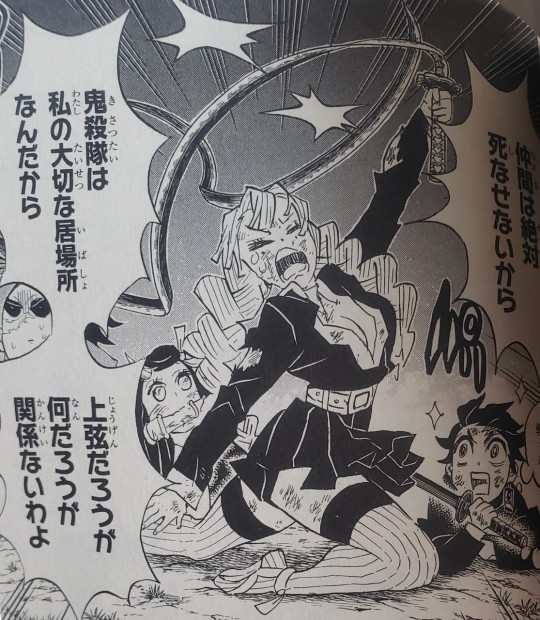
Following this historic feat; acting in a way that is natural to her and to her Breath to unlock a mark she didn't even know existed, she still feels a little shamed among the other Pillars for being so shamefully inarticulate about battle technique; despite this being what she's dedicated her life to. Again, it was never her natural desire to be a fighter, so it’s unsurprising that this part doesn’t come as naturally to her as it does to all those geniuses in the room.
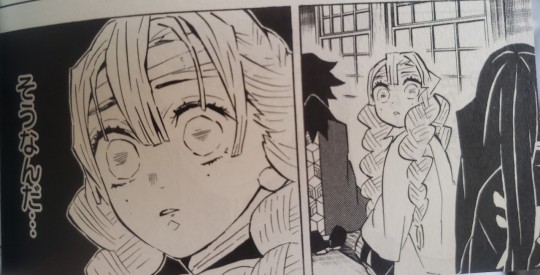
Moving on to the battle with Nakime, this is mostly played for laughs because Mitsuri's lack of battle sense compared to other characters is put on full display. She's emotional from the get-go and easily overwhelmed and this affects her concentration drastically, leading to stupid mistakes and ultimately having to fall back on her brute strength to break through pieces of the fortress instead of survive and fight through observation. Getting called out on this is meant to help her, and she absolutely does her best to summon back her battle sense, but it's all downhill for Mitsuri and her Love Breathing technique from here.
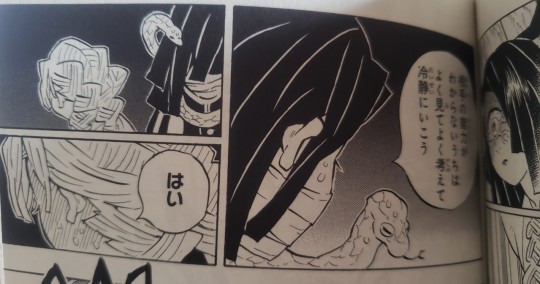
As the battle with Muzan starts, that third wish is thrown back in her face as so many of her juniors die protecting her. Since he's powered by philanthropic love and confidence, she cannot recover any battle sense, and quickly falters so much that she must be removed from the battle rather than weigh everyone down. The difference between her and the other Pillars here is stark; her inexperience and lack of natural fighting inclination is, again, painfully obvious and relatable to a lot of readers. She has natural strength, but not natural talent.
When she does return to battle, she only has that core strength to rely on again--no room for peace of mind, only brute emotional strength resulting in a panel that made me throw my fist in the air and cheer out loud because damn, that is hardcore, girl.
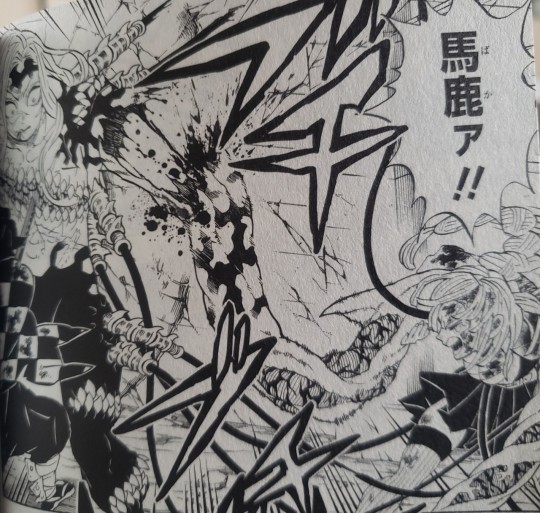
But, in the end, Mitsuri succumbs to her injuries, and only right before death does she get closer to Wish B. Even with Iguro's promise, it's too late.
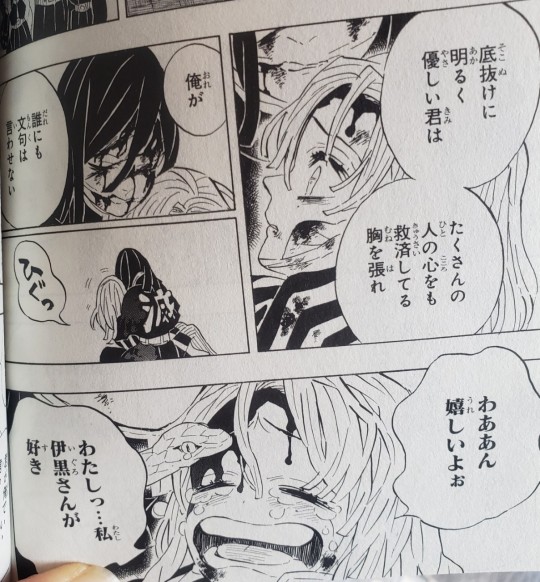
This is super frustrating for a number of reasons, but if we're focused solely on the actualization of Love Breathing, it's because Iguro could have said something much, much, much sooner if he wasn't so ashamed of his own blood tainting her in this lifetime (not that she would have cared). Words from other people have such a huge influence on Mitsuri that if she had actualized Wish B, for which her Breath is named, she could have made humongous gains in confidence before being romantically loved, and having someone to openly shower in love. Imagine what she could have unlocked, if that shame she still carried for being too monstrous to be married could have been eliminated.
But that's not all. What if the timeline had been different? What if she had not two, but five years’ experience? Or even more than that? What if, for a long duration of her experience as a swordsman, she was also experiencing a happy marriage?
I invite you to consider the implications of a Mrs. Iguro Mitsuri who has the comfort and confidence of being herself with a husband, in addition to being in a leadership role in the Corp? A Mrs. Iguro who, with a little honesty from her husband who feels bothered that she’s embarrassed, stands up to Maeda-san and says that as a married woman she needs a more modest uniform?* A Mrs. Iguro who gained a level-headed battle sense that can only be refined through experience, not based in brute strength alone?
She'd be such a happy badass.
*(Not looking for a modern-era Western culture based debate on this; this is defined based on Mitsuri's desire for a proper Taisho Era marriage.)
Now, remember those pins I put in place?
Consider someone else who realized a natural Breath technique all on their own, who attained a mark without any intention to, who felt like a monster due to super human abilities that made them shamefully unable to fit into the ideal family life, despite only wanting a peaceful, happy wedded life? Someone who valued bonds with other people, a kind person who lived to protect others?
Now, I'm not saying that Love Breathing is as powerful as the Breath of the Sun, or that Mitsuri is as innately powerful as Yoriichi (their natural skills were of different types entirely). But, as all Breath techniques stem from the same natural Sun Breathing source, Love Breathing might have found its way back a little closer to that source, in some way or another.
Which is all to say, never look down on Love Breathing or on Mitsuri just because she didn't play as big of a role as the others in the final showdown.
After all, that Breath was not yet all it could have been, and as a swordsman, she was not yet in full bloom.
317 notes
·
View notes
Text
It’s Cold in that Fridge: The Case of Nakari Kelen
Since The Case of Mara Jade has been doing the rounds again, I’ve finally gone back to this post that has been sitting in my drafts for literally years. So let’s honour this absolute badass who deserved better:
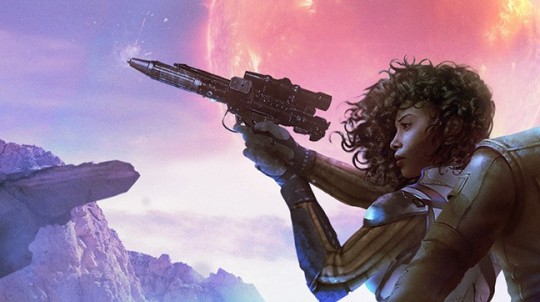
Once upon a time, the Star Wars universe was but six films (and a tv series) in the story of the Skywalker family. But beyond George Lucas’ story was an absolute boatload of books, comics, games, and other materials that made up the Expanded Universe. When Disney purchased Lucasfilm and the rights to the Star Wars saga, everything in this universe was decanonised and deemed “Legends” - some aspects of this universe were retained or re-purposed, others sit in Disney’s figurative vault and will likely never see the light of day (and seeing how the ST turned out, maybe that’s for the best).
But this transition between Legends canon and Disney canon was not so simple, because the nature of publishing meant that there were novels approved during the time of Legends canon that would be released in the time of Disney canon. In particular, there had been the planned trilogy “Empire and Rebellion”, set between A New Hope and The Empire Strikes Back, with each novel from the perspective of one of The Big Three.
Razor’s Edge (Leia) and Honor Among Thieves (Han) were released prior to the Great Canon Split of 2014. But while the Luke-centric novel had been planned, it was not due to be released until well after the Split. So Heir to the Jedi (so called as an homage to the Legends progenitor Heir to the Empire) became one of the first books of the Disney canon.
What does this background have to do with Nakari Kelen? Perhaps nothing, but I do wonder how the writing process was affected by the shift from Legends to Disney - was the novel a relic of the old EU with any reference the LFL storygroup didn’t like excised during editing, or was it a trendsetter for the new EU, a Sign of Things to Come?
The most salient point being, of course, that Nakari Kelen - like so many love interests before her - was not allowed to go along her merry way at the conclusion of the novel, but was shoved into the fridge.
If there was one constant of the Legends EU, it was that Luke Skywalker’s love interests couldn’t catch a break. Mara Jade naturally lasted the longest relationship-wise, with almost twenty years of marriage to Luke before some bright spark decided she had to go (as per the aforementioned case study). But before Mara there was Jem, Shira Brie, and Gaeriel Captison (who came close to escaping the curse), and in the Legacy of the Force series they brought back sole survivors Akanah and Callista, only to kill them off for good too (and rather brutally, if I may add).
So perhaps when Kevin Hearne began writing HttJ within the confines of the Legends continuity, he was merely sticking to the status quo, or perhaps once subsumed by Disney they needed to make sure Luke's slate was clean (so to speak). And I can’t put all the blame on Hearne since I don’t know whether it was his idea, or LFL mandated - but regardless it was a poor decision.
The root cause of fridging, imo, is limited imagination. How best to cause your male protagonist pain if not kill off someone they love, or at least have strong feelings for? The answer is of course, easily. But I’m getting ahead of myself.
The Luke Skywalker of HttJ is fresh from his victory in ANH, a lieutenant in the Rebellion: young, not dumb, and full of...
Nakari Kalen is an absolute Queen a civilian volunteer and crack-shot sniper who loans her ship Desert Jewel to the Alliance. Luke is immediately attracted to her, they bond over a mutual love of fast ships and leaving behind desert home planets, and engage in the inexpert flirting of two nineteen year olds while also risking their lives several times over.
I want to make it clear: I actually really like this book. It's a breezy read, almost serialised as The Early Adventures of Luke Skywalker, and is ofttimes genuinely funny. And credit where it’s due to Hearne, many of of the supporting roles in the novel are female. Other than Nakari, there's Soonta, the Rodian who gives Luke her uncle’s lightsaber, Sakhet the Kupohan spy, and the Givin cryptographer/math genius Drusil Bephorin. In a genre where male characters are often the default for these kind of roles, it was nice to see, but makes the regressive fridging of Nakari even more egregious.
Luke and Nakari make a good team fighting brain-sucking monsters and Imperials, but more importantly they have fun together - she encourages him to work on his Force skills, and he successfully moves objects with his mind for the first time (leading to Nakari adorably dub him "a little noddle scooter"). It's a very sweet, if brief, relationship, and a respite from the danger of the mission. They spend the night together (leaving the reader to decide exactly what happened behind closed doors), and share a kiss before splitting up to try and escape bounty hunters. No prizes for guessing what happens to Nakari immediately after she received the Skywalker Kiss of Death.
I assume there were two motivating factors for why Hearne and/or LFL couldn't let Nakari live:
1. If she survived, fans would wonder why she doesn't appear in ESB/subsequent material.
I recall this bandied about on forums back at the time of the book's release, and to that I say - so what? Fans are always going to wonder, and try to paper over the gaps in canon, to make up their own headcanons to explain any any perceived inconsistencies. It's certainly no reason to kill someone off.
It is in fact possible for two young people to have a romance that just fizzles, or doesn’t work out for whatever reason - it should not require great maneuvering or explanation. If Nakari doesn’t show up in the next book in the timeline, what about it? The reader is smart enough to assume she and Luke broke up, decided to just remain friends, whatever. But it seems that the only way for a female character to exit stage left is for her to die, which is bullshit.
And actually, there's no reason why she couldn't have shown up again. ESB and RoTJ cover a month and a few days, respectively, of Luke's life - just because there was no mention of Nakari doesn't mean she didn't exist at that time, whether or not she and Luke were an item. She could have made an appearance in a subsequent novel, or Rebels, or the comics - she could have become a recurring character, showing up when the Rebellion needed her, or - heaven forbid - even have her own comic/book/show! Her existence in Star Wars canon didn't need to begin and end with Luke Skywalker, merely to service his plotline and backstory and abandoning the richness of her own.
No, the only reason Nakari had to die was to facilitate this:
It was a blow to the gut, realizing what that sudden absence meant. I hadn't seen it with my own eyes, but I had felt Nakari's life snuffed out through the Force, and into that void where she had shone anger rushed in - anger, and a cold sense of raw power and invincibility...I took a step to join in the hunt but stopped, breathing heavily, unaccountably sweating even though I felt so cold inside and the power of the Force roiled within me... I shook with emotion and power, and none of it felt the way the Force had before...I saw what kind of space it was , a black hole that would always be hungry no matter how much I fed it. I might never feel warm again if I didn't get myself under control.
Luke feels the dark side and is tempted by the boost of power it offers him, but immediately identifies it as dangerous and unnatural. I can understand why Hearne wanted to include this - it is a book of firsts after all: Luke's first solo mission, his first time using telekenisis, and ending with story with his first experience of the dark side makes sense. But it wasn't necessary, which leads to:
2. How to push Luke to touch the dark side without killing someone he has romantic feelings for?
Also, obviously, shite of the bull (or nerf, if you prefer). Even if this brush with the dark side was absolutely necessary for the novel's climax, there's any number of ways it could be achieved. At this point, Luke is fresh from losing important people in his life - Owen and Beru, Ben, and Biggs - lumping another death on top of that a narrative trick for Luke to react not only to losing Nakari, but the others as well. But it's cheap, the first card in the deck, and why not show a bit of imagination? Luke is young and inexperienced enough at this point that any number of things could be the catalyst - the whole book he's struggling with his growing powers, why not try and reach too far in the firefight with the bounty hunters, his anger and frustration with himself in not doing enough trigger the dark side temptation? It would work thematically and doesn't involve a fridging that ultimately has very little payoff.
Because Nakari is killed less than ten pages from the end of the book - afterwards Luke grieves, but ultimately chooses to honour her memory and be grateful for what he learned with her, recommitting to becoming a Jedi. It's all very surface level, and once again a female character's death facilitates a male character's development. Was it so imperative that Luke lost someone he cared about as part of this story? Sure, this was a time of galactic civil war, and it's far from unrealistic that these stories have a high body count, but who to make collateral damage remains an authorial choice, and in this case Nakari Kelen was (a) a female character of color, (b) a love interest of the protagonist - not just of this book, but the entire Original Trilogy.
I don't know to what extent (if any) race had to play in the decision. I'm sure there was a segment of the fandom absolutely livid that Luke Skywalker kissed (and maybe had sex with) a black woman. Was her death LFL hedging its bets, or demonstrative of the general lack of attention/respect they show their characters of colour?
In any case this was a chance to stand out from the old EU and it's fridge full of Luke's dead girlfriends, but instead they chose to introduce and kill off Nakari for the sole purpose of Luke's manpain and character development, and that's gross.
And then there's this:
A grisly yet reliable fact about custom bounty hunter ships is that you can always count on them to have body bags stashed somewhere for the easy transport of their kills. They often have built-in refrigerated storage, too.
NAKARI IS KILLED AND LITERALLY STORED IN THE FUCKING FRIDGE I COULDN'T BELIEVE WHAT I WAS READING.
I really hope this was unintentional on Hearne's part, because yikes. He was halfway there, this book was full of interesting female characters who had agency - Drusil in particular was a delight with her super math and inability to understand human interaction. Nakari was full of life and fun - capable but relatable, showing a different side of the Rebellion and those that suffered under the Empire's rule. Fridging her in her first appearance is considerably more vile, because it reduces her to a footnote of Luke's story, a plot device to Help Him Grow, rather than a springboard to tell more of her own story.
Because Nakari was a compelling character ripe for spinoff potential. I would absolutely have read or watched her continued adventures, juggling missions for her father's Biolabs company and trying to aid the Rebellion, shooting her slug rifle and cracking wise, maybe even finding a way to amplify her mother's song Vader's Many Prosthetic Parts to really stick it to the Empire, or try and free the political prisoners on Kessel.
The old EU was made great by allies and enemies of Our Heroes showing up again to help or hinder them, and/or branching out into their own material. We fell in love with them, and followed their stories even as they diverged from the main saga, eager to read more about their lives.
Nakari Kelen never got that chance. In many ways, she exemplified what Disney Star Wars was to become: an exercise in wasted potential.
#star wars#star wars meta#heir to the jedi#nakari kelen#luke skywalker#fridging#it's cold in that fridge#star wars expanded universe#nucanon
63 notes
·
View notes
Text
10 Steps to Attract the Life You Want
By Heather Mathews
Author of Manifestation Miracle
“What you seek is seeking you” - Rumi
If I told you that you could create the exact type of circumstances you want, would you call me crazy?
What if your very thoughts could create ripples of change that not only impact your life…but those around you as well?
Philip, a call center worker from the Philippines certainly didn't think so. He dreamed of moving overseas so he could secure a better life and provide for his family.
But at every turn, his own mind shut down every opportunity he thought of.
For instance, Philip considered seeing an immigration consultant, but he either “didn't have the time” or “couldn't afford it”.
So, he resented his situation and cursed himself (and the world) for his “bad luck”.
He didn't realize that the real culprit was his mindset - not his circumstances.
And it seemed like the more he ruminated, the more bad things happened.
Thus, he kept feeding the cycle of being stuck in a rut and feeling bad, trapping him even more.
That was, until his aunt Sara introduced him to the Law of Attraction.
Turning the tide
Before she moved to California, Sara had been close with Philip and treated him like a son.
She had her own share of struggles finding greener pastures abroad, but she applied the principles from the Law of Attraction to overcome them.
So she sent a few books on the topic to Philip through Amazon so he could gain the clarity to turn his life around.
Discover the Lazy Person's Secret To Get Everything You've Ever Wished For
----- CLICK HERE ------
At first, Philip didn't really think much of it, but he decided to read through the books since his aunt went through the trouble of sending it over.
After he started applying the lessons he learned from the material, things started to change for him.
It came as a complete shock to Philip - he never thought in a million years that making a simple shift in his thinking could have such a direct and POWERFUL impact in his life.
And soon enough, the fog of negativity and despair around Philip lifted and he found a way to make his dreams happen.
Through his persistence, he was eventually able to borrow the money he needed for the consultation fees, and learned the step-by-step process to get work overseas.
Philip was finally able to find a fulfilling and rewarding career in Australia. Not only does he get to support his family back home, he also made friends and enjoys his new life abroad.
Just a few months ago, Philip's parents started their own business, thanks to his help.
At the rate they're going, his family could save enough so they can pass on their business to another relative and follow Philip to Australia. ould wait for Philip to take the offer so they can move there instead.
Whatever option Philip chooses, the possibilities for him are almost limitless.
But he's just one of thousands who made the Law of Attraction to work for him. Like Philip, a lot of people are initially discouraged to try because they think it takes a lot of work.
But the reality is that it's surprisingly easy to get started. You just need to follow these 10 Super Simple Steps to Attract Everything You've Ever Wanted:
MORE ABOUT Motivational / Transformational
Step #1: A little gratitude goes a long way
The first thing you should learn about the Law of Attraction is that it operates on energy.
YOUR energy, to be exact.
Everyone has a different kind of energy they bring into the world, and it affects them in ways they often don't see or appreciate.
The secret lies in the FREQUENCY of a person's energy - and you need to raise yours in order to change your life.
Think of your unique energy as a sort of gas that fills the space of your reality. Whatever “gas” or “energy” you pump out into your immediate space will define your existence.
Viktor Frankl, a psychiatrist and Holocaust survivor, said this in his book, “Man's Search for Meaning”:
“To draw an analogy: a man's suffering is similar to the behavior of a gas. If a certain quantity of gas is pumped into an empty chamber, it will fill the chamber completely and evenly, no matter how big the chamber. Thus suffering completely fills the human soul and conscious mind, no matter whether the suffering is great or little. Therefore the "size" of human suffering is absolutely relative.”
So if you want to invite great things into your life, you need to set the stage first. And you can do that by leading with the right energy.
That's why being grateful and appreciating what you have is powerful way to recalibrate your frequency.
Most folks hold off on feeling this way for AFTER they get what they want. But that's putting the cart before the horse, as the saying goes.
When you LEAD with gratitude, it will act as the precedent for everything good that follows.
Discover the Lazy Person's Secret To Get Everything You've Ever Wished For
----- CLICK HERE -----
What I like to do is start of my day by making a list of things that I'm grateful for. If I miss anything, I save it for later and update my list at the end of my day.
And when I go over my list during the weekend, I'll see exactly how much good stuff I've accumulated.
This creates a kind of snowball effect and helps me attract even MORE good stuff down the road.
MORE ABOUT Motivational / Transformational
Step #2: Be generous
This can be a challenge for some people if they feel like there isn't enough to go around.
But if you take the initiative to SHARE whatever you can without asking anything in return…
… you'll generate the kind of energy that attracts prosperity for everyone…
…including YOU.
Again, this is the Law of Attraction at work.
Try offering your time, talents and material wealth to those who need it - you'll soon invite blessings without even trying.
MORE ABOUT Motivational / Transformational
Step #3: Visualize your future
What I find amazing about kids is how powerful their imaginations are.
When they role-play with other children, you can see in their eyes how REAL their games are to them.
This is something that's lost on grown-ups, and it's important to recapture that ability to envision the kind of reality you want.
The Universe likes to play games with us- the better you are at visualizing, the more you'll be rewarded.
Like I said, a certain type of energy attracts a certain kind of reality.
So if you focus your energy and thoughts on that dream job you want or the car you've always wanted to drive, you'll raise your frequency to ATTRACT those exact things.
MORE ABOUT Motivational / Transformational
Step #4: Let the negativity pass
When the bad times roll in and you feel like dirt, sometimes it's better to step aside and let it run its course.
Having negative thoughts and emotions are totally normal, but you don't always have to wrestle with them.
You can simply acknowledge what's going on in your inner world - then CHOOSE to keep moving forward anyway.
Let this negative energy pass through your system like bad case of gas. The sooner you let it do its thing, the quicker you can get back to what you were doing.
(Sorry for the fart analogy, but it get the point across, doesn't it?)
MORE ABOUT Motivational / Transformational
Step #5: Never stop growing
It's good to have a daily routine in your life, but not at the expense of your personal development.
Most people are so set in their ways that they're afraid of the thought of doing something new.
Then they complain about their humdrum lives, or that some folks “have all the luck.”
Breaking out of your comfort zone is never an easy thing, but it's a step worth taking.
No matter how loaded your schedule is, find some chunks of time to do things that will help you grow.
Whether it's taking an online course, joining a community, or taking up a hobby, this is a powerful way to attract new and exciting things in your life.
MORE ABOUT Motivational / Transformational
Step #6: Avoid the “toxic” crowd
There are people who seem hell-bent on pulling others into their world of misery.
Whether they're trying to lessen their own pain or simply enjoy doing it, you need to steer clear of them.
Instead, choose people who will have the opposite effect on your psyche. Not only does a person's energy attract circumstances, it's also CONTAGIOUS.
So make sure you hang out with the people who'll inspire you to achieve greater things - and not bring you down with apathy or inaction.
Learn How to Force the Universe to Manifest Your Dream Life -
CLICK HERE
MORE ABOUT Motivational / Transformational
Step #7: Give yourself permission to succeed
Most of the world's most brilliant people were put down in some way.
Somewhere along the way, someone told them they'd “never make it” or were “destined to fail.”
In your own life, certain people have tried to discourage you in some way.
They might have tried putting you down when you were growing up - or it could have been last week.
It doesn't matter.
What's important is that you understand that NO ONE can put labels on you.
And more importantly, they can NEVER give you permission to achieve what you want in life. You need to do that for yourself.
Don't let their words define your “story”. You don't have to fit whatever petty narrative they're trying to force on you.
MORE ABOUT Motivational / Transformational
Step #8: Affirm who you are
Instead of feeding into the lies that people tell you, let this be the day to start living your truth.
Create statements that embody the truth you choose to be, AND to live in.
People do this all the time.
When Elon Musk tried to launch the world's first privately owned rocket and failed, he told himself, “I'm going to try again, and I WILL get that thing into orbit.” (Well, maybe not exactly like that, but you get the point.)
And so his company SpaceX went back to the drawing board and got it right after the third attempt.
Elon affirmed his truth and it manifested into reality. In the same way, you can choose to affirm whatever truth applies to you.
Be honest with yourself and acknowledge the things that TRULY matter to you.
You know it, and the Universe knows it.
The key is to repeat it yourself every day. For example, if you know deep in your heart that you want to make a better life for yourself, you can say something like this:
“I may be struggling right now, but I know deep inside that I have what it takes to improve my life. I see myself transforming into a happier, wealthier person who makes other people's lives brighter.”
When you operate from even the tiniest shred of truth, you can grow that into a powerful force over time.
MORE ABOUT Motivational / Transformational
Step #9: Fail spectacularly
Here's something most people don't know about the Law of Attraction: before you can enjoy success and find true happiness, you need to crash and burn.
It's better to go after what you want and risking failure rather than playing it safe and not trying at all.
To create order in your life, you'll have to embrace the chaos that comes before it.
This is where you'll find the real lessons, even if they hurt a little.
(Or in some cases, a LOT).
Think of yourself as the beautiful Phoenix, like in the legends.
Imagine burning off bits and pieces of yourself that you don't need. As you rise from the ashes, you're reborn into a NEW YOU.
That's evolution. It may be an imperfect and unpleasant process, but the results are worth it.
MORE ABOUT Motivational / Transformational
Step #10: Remove your BIGGEST barrier to success
People don't realize that their greatest roadblock is none other than their own mindset.
They may say they want something to happen, but don't REALLY mean it.
For instance, someone might want to lose weight, but they don't want it bad enough.
Worse, they might not actually believe they can shed those pounds. A part of them refuses to acknowledge the faintest possibility of it happening.
This is pretty much why people NEVER attract the things they want in life.
In order to remove this barrier, you'll need to change something inside you.
You need to dig deep and understand WHY you don't want it as much as you say you do.
Are you scared of suffering through the process of getting what you want?
This is what turns most people off - they simply can't process the discomfort involved with growing up.
At the same time, you need to deal with the reasons why you think that your desired reality is impossible.
It could be some deep-seated beliefs brought about by past events, or experiences growing up.
Once you sort this out, you'll be free to do what you want without any pre-programmed beliefs holding you back.
Now, these ten steps we just talked about will get your foot in the door. Once you start doing them regularly, you'll experience remarkable breakthroughs you didn't think were possible.
But if you want to witness even MORE changes on a massive (or even cosmic) scale, you need to check out my FULL course called Manifestation Miracle.
Like the name suggests, I enjoyed nothing short of a life-changing revolution not too long ago.
In a lot of ways, my situation was the same as Philip's. I worked myself to the bone and felt unfulfilled.
I was trapped in my soul-crushing career. Even though I needed the money, I HATED having to put up a hollow appearance of a happy, successful businesswoman.
But then I discovered how turn my mind into a magnet for prosperity and abundance…
Learn how I unlocked the secret to ATTRACTING anything AND everything I wanted - CLICK HERE to watch the video now…
MORE ABOUT Motivational / Transformational
#law of attraction#attract abundance#attract wealth#attract prosperity#how to manifest#get what you want in life#attract anything#manifestation#manifest more money#Attract More Business/Clients#manifest wealth and abundance#manifest love#manifest health#manifest miracle#law of attraction business#manifest your desires#Manifest Snything You Want#manifest instantly#manifest quickly#weight loss#law of attraction money
43 notes
·
View notes
Note
YOu have a lot of interesting thoughts abt Winter what dyou think will happen with her this season?? Iknow you already said she won't die but. other stuff?? What do you think of the idea that she defects to salem
y’know, anon: i was actually gonna write something to this tune unprompted before the hiatus ended? i didn’t, because when it’s inevitably revealed that i was wrong about Everything and the village children throw their eggs and laugh i didn’t want to give them any more receipts, but now that someone has asked i might as well
quick disclaimer before i start! these are subjective speculations about a character who has thus far been--particularly in 8.1--sparsely and ambivalently characterized, on purpose. i am spinning from the same subtext as anyone else, and if i am reading it differently, then all that means that i am reading it differently. Mr. Teeth is not sending me secret data. i am not the Steve Kornacki of RWBY Defections, as hilarious as it is to imagine someone like that existing.
okay? okay. below are some ideas and theories about where Winter could be going this season
The Defection (no not that one yet)
yeah, i’m still an “AceOps defect as a team” truther. this one actually has the least to do with Winter, and most to do with story economy. and the story of the AceOps is this: under Clover they were “the perfect team”--efficient, powerful, professional, and the perfect emblem of Atlesian values. law and order above all else. the mission matters more than the team. don’t get attached.
Clover’s absence from the team begins in late season 7, which means all that shiny varnish is stripped from Atlas at the same time it’s stripped from the AceOps. it turns out that the law isn’t always right, it turns out it’s super easy to turn “the needs of the many” into “the needs of the few who have many,” and it turns out once you go even a single inch past their facade the “best Huntsmen in Atlas” are conflicted, directionless, and squabble like children. they have a better showing against Penny this season, but their continued dynamic shows that fault lines--particularly between Marrow and Harriet--are reaching crisis. The AceOps model is unsustainable, in the same way that all of Atlas is ultimately unsustainable.
then Ironwood puts Winter in charge, and at first i did think: well, this is probably just to accelerate the inevitable fallout. they are, by their own testimony, emotional strangers to each other, and now some of them disagree on ideological grounds to the point where they can barely stand to be in the same room; slapping an abrasive volatile live wire on top of all that is pouring gasoline on Rome while Rome burns.
but the revelation of Renvision was that they’ve been lying--about HAVING feelings, but also about their feelings with and about each other. moreover: Winter’s own emotions mirror theirs. they’re speaking, in whatever horrifically repressed way, a similar language.
i’m not going to discount the possibility that this kind of ice-water-in-the-face moment might not be enough for some of them; one thing i’ve always respected about RWBY is its unwillingness to flinch away from the idea that sometimes it IS too late for people. but when it comes down to the AceOps, i think the operating question isn’t “will they pick JOYR over setting off the bomb,” because they’re not ready to make that kind of decision together as a team yet. no, the operating question is: if it comes down to one of them, or setting off the bomb, what will they choose?
Clover would set off the bomb, without hesitation or remorse. the mission and protocol HAVE to come first, and in this case there’s a compelling argument that it’s the right call. the team under Clover would have followed suit. the team without Clover would have likely done the same.
the team under Winter...
well, the thing about Winter is that she’s NOT Clover. not a perfect soldier, but--let’s stick with “not a perfect soldier.” she cannot lead in the same way Clover did, with that infuriating mixture of self-assurance and personal charisma, but i don’t think she thinks of herself as any less in command, which means that for the time being, the AceOps are her team. i can’t be certain what Winter would choose in this situation--whether her personal feelings can win out against years of consequentialist thinking--but i do feel fairly confident in saying that she’d be more willing to sacrifice HERSELF in order to choose both.
and in this crucial moment where the AceOps are forced to re-evaluate how they feel about each other, and the team, that might count for something.
so tl;dr #1: the AceOps find a team identity separate from the Atlesian structure. whether they defect to the RIGHT people, or survive defection, and whether Winter counts narratively as one of the AceOps by that point, i’m less sure about, but a cursory stab in the dark would be: yes, not all of them, and no.
The Return
how much do the writers care about the Winter-Ironwood dynamic? probably less than i do, but i also care more than any human should be permitted to under the law, especially since people have moved onto speculating about all the hot NEW abusers she could have in her life. whatever--it is something that needs closure, and i think the writers know that. my preference is still that they confront each other in person, at Atlas Academy (Qrow having fucked off via either healthy decision making or force). if this does happen, i don’t think there’s any chance that both of them will make it out alive; Winter would ONLY confront Ironwood if she’s forced to--either by him or other forces--and both of them are too rigid with themselves and with each other to offer any kind of give, or forgiveness.
that’s what i’d prefer, but it no longer seems the most likely option; Winter clearly has no plans to make it back, and the queue for “people who want to slug it out with DILF Jimmy” just keeps getting longer. it’s possible that they’ll end on the same personal-impersonal teeter-totter which they’ve always resided, where they’re just voices in each other’s earpieces, and she’s giving him a report, and he is issuing her orders.
there’s a way to make that meaningful, though: Winter HAS just disobeyed an explicit order--the first she’s done when she fully had the capacity to carry it out. her own treasons are piling up, and it’s a secret that he should know, for plot and character reasons. the obvious choice among the AceOps to tattle is Harriet, but i also think there’s a nonzero chance that, if asked, Winter herself will tell him. for all her flaws, i do think Winter is capable of owning up to her decisions (it’d make a nice parallel with Yang telling Ironwood about what she and Blake did during Gravity, but that’s neither here nor there), but even more importantly...i think she’d tell him because she wants to be reassured. that she did the right thing, but also that they’re still on the same page, and that he’s still the same person he always was, with her.
he won’t reassure her, of course. especially after he finds out that she disobeyed him for Ozpin. she’ll have no one left.
tl;dr #2: Winter and Ironwood have to reach some kind of End by the finale. whether it’s with a bang or a whimper i’m again less certain of, but if it DOES end with a bang one of them will die, and it’s going to be Ironwood.
Winter Alone
i, like many others, assumed going into the season that Winter’s core dilemma would be something like “her family or her family,” meaning: her sisters or her (adoptive) father. but i think as far as the show’s concerned that conflict was resolved when she let them go in The Enemy of Trust, and it’s not worth re-litigating. since the season started she’s just missed Weiss and/or Penny TWICE by narrative contrivance--during the Amity heist, and the abortive recovery mission--and she’s been sent away from Ironwood. it’s increasingly looking to me like Winter and Weiss will not talk to each other at ALL this season (do they have Scroll reception in the whale? i guess they must if Watts talked to Tyrian), or at most will only catch a tantalizing glimpse of each other before being whisked away again. all of this points to the issue not being “whose side will Winter choose,” but “what kind of person IS Winter, when she doesn’t have anyone else’s ideology to fall back upon?”
which is very exciting to me! the What You Are in the Dark trope is an obvious staple, but i’m especially a sucker for it when it happens to characters like Winter, who lucked out in the sense that their more selfish motivations (protecting herself from Dad) have never quite conflicted with doing Good (protecting other people). the cognitive dissonance for that with Winter has already been played up to the max, so for it to come to a crisis for her, at a point when EVERYONE WHOSE OPINION SHE CARES ABOUT HAS ALREADY FUCKED OFF, is just great drama. it’s made all the better by the fact that RWBY specifically has a lot of villains whose backstories involve them being put in a similar situation, and choosing wrong: Adam chose spite. Raven chose cowardice. getting to see someone make that choice in the story proper, then, adds to and complicates what RWBY has to say the conditions of possibility for heroism and villainy.
furthermore, and this might be where my biases become delusions: that Winter is being maneuvered to make these decisions for herself, BY herself, points to the possibility that she might be graduating from a mostly region-locked character (Ilia, the Belladonnas, Beacon staff and students) to full-on supporting cast (TRQ, Maria, the villains). if Weiss and/or Penny reach out to Winter in a climactic confrontation this season, then the story isn’t NOT about Winter, but it would place more emphasis on Weiss and/or Penny, as main cast members, and their ability to save a person they love. but if their relationships are given more space and time for breathe (or fester!)--if Winter gets to change away from Weiss in the way that Weiss changed and grew away from Winter in Mistral, for example--then it points to a greater parity in terms of their mutual importance in the story.
tl;dr #3: Schneester Bowl might have to wait at least another season, because Winter’s too busy trying out independent thinking. now, whether Winter will make the RIGHT choice, or the story will LET her make that call after she’s decided...
2Defect2Salem
i actually touched on this before, so tl;dr #4.1: i do not find the ways that people talk about HOW Salem gets Winter to defect to be very convincing. the idea that Salem could easily manipulate Winter because they have similar backstories makes me...tilt my head, but i think that’s more due to my personal belief that people who are similar in those ways actually tend to be each other’s blind spots (i also think this about Blake and Winter, FWIW). more to the point: my personal reading of Winter locates a streak buried deep within that is unyieldingly CATEGORICAL. despite being embedded within Atlesian rationality, despite her mentor being James Ironwood, there is something in Winter that instinctively judges an immediate instance to be right or wrong, and she’s never been able to suppress that all the way.
and with that in mind, i genuinely don’t think Winter is enough of a long-term, big picture thinker to give herself over to despair for Atlas as a whole. oh, we see her parrot “for the good of all, not just a few” just fine, but if she was already having trouble internalizing that when it was coming from IRONWOOD, a man she loves and trusts, then why would Salem--a person she is predisposed to distrust--be better at convincing her that the ends justify the means? why would she believe that submission is preferable to extinction from someone that EVERYONE SHE KNOWS considers an enemy? it’s hard for me to conceive of a Winter who, perched at the lip of the despair event horizon, will a) think enough of herself to make a decision for everyone and b) accept that the decision is imperfect and compromise, when she could just do what soldiers do, what she’s been asked to do, and die for an impossible cause.
(also not to belabor the point, but: ...how is she supposed to deliver Atlas to Salem? are we assuming that the Atlas Military works via Klingon Promotion, or that Ironwood gave her all his passwords?)
this is not to say that i think Winter will completely no-sell Salem (though that would be VERY funny). assuming that she and Salem do end up in the same room (which is still up in the air), i can easily picture a scenario where Salem manipulates Winter into making a bad decision (though honestly, Winter’s been doing just fine with that all on her own), but the distance between “a bad decision” and “a decision that she knows will help the Big Bad” is still quite far. i can similarly picture a scenario where Salem gradually sways Winter--not a single Anakin-style dramatic reversal, but an Atris-style descent-by-inches, through a million little non-choices--but that’s the thing: manipulation takes TIME, no matter how good at it you are, and we’re running up against the fact that the season ends in 6 episodes, and Winter is only one of about a trillion dangling threads.
tl;dr #4.2: the only way i can see Winter defecting to Salem THIS SEASON, then, is if it’s not her choice at all. for me, this makes the most thematic sense--that she’s been playing keep-away so long with her own agency, and Salem ends up resolving the issue by taking it away from her completely. that she wants so much to be sure she’s making the right choice, or to not have to make the call, and Salem gives her exactly what she wants. she’ll never have to think for herself again. we know Salem is capable of something like that, because we’ve just seen the Hound. Winter won’t be another Hound, if only because churning out the same horror will only yield diminishing returns, but she might be...something else.
regardless, tl;dr #4.3: if “Winter defecting to Salem” shakes down in any way--either as originally posited or as i just described--it would be an FANTASTIC story and character engine. i’ve already talked about the potential conflict this could create within Team RWBY, but like...imagine Weiss talking to ANYONE about her sister. imagine Weiss talking to Emerald, who would have just joined the heroes, whose decision to cut herself off from Cinder would feel like a portent. imagine Winter with the villains! not just Salem, but Cinder! imagine the subtextual parallels between the two becoming TEXT. imagine the two of them having to work together! imagine how Cinder would feel to lose Emerald and get Winter. imagine how Mercury would feel! can you imagine Winter and Mercury bonding over their daddy issues?? because i can’t! but i wanna. my love for Winter isn’t contingent on her making the right choices, but on her getting the right material. this would not only be the right material, but A LOT OF IT, and if the writers do choose to go in this direction, i trust them enough to be excited about where it might go.
#Anonymous#winter schnee#rwby#happy to announce that i am here to disappoint everyone on both sides of the 'will winter defect or nah' fence!!#don't you all feel lucky#'i wish hornets didn't sting me' complains area woman as she swings a bat wildly at a hornets nest#helen writes meta
24 notes
·
View notes
Text
5 Simple Ways to Change Your Life With The Law Of Attraction (Learn This)
Johanna, a college student from Kuala Lumpur, had been struggling to finish her studies.
She was living in a dorm with other students and had trouble making ends meet.
Johanna was on a scholarship which meant she needed to keep her grades high while working part-time to support her living expenses.
Strapped for time and resources, she barely got by and started feeling burnt out. If Johanna wasn't hitting the books, she was working.
Everything started to become a blur and she was losing motivation to keep going.
It got so bad that Johanna even thought about telling her parents she couldn't do it anymore and drop out of college.
But then a classmate from her philosophy class introduced her to the Law of Attraction.
Jacques, a foreign exchange student from Canada, had been reading up on it and applied it in his own life.
According to him, it had helped him manifest a solution to his own problems.
He had lived in an abusive home growing up, and Jacques learned how to shift his thinking and perspective to change his circumstances.
Johanna wasn't sure at first what to make of it, but she took Jacques's word for it and started applying its principles in her own life.
Click Here To Discover the Lazy Person's Secret To Get Everything You've Ever Wished For <= [Link this text via your affiliate link]
After she made a shift in her own mindset and attitude, Johanna started to experience some positive changes.
She eventually quit her part-time job and found another one with better pay and hours which helped with her living expenses.
It also helped free up her time, so she managed to study AND start a side income project selling items online.
Johanna ended up growing her side business so much that she got Jacques to help her manage it.
By the end of the academic year, she had turned into a completely different person.
Johanna was no longer a depressed, burned-out student from before. She had become a self-sufficient student and even made the dean's list!
The Power of Changing Your Focus
Sometimes, we get so discouraged that we feel powerless to change our situation.
Like Johanna, we fall into a FIXED mindset where we think things will stay the same and we can't do anything about it.
But the only way to break out of this negative spiral is by changing your INNER world.
This is the key to influencing your external world so you can move forward in life.
In a nutshell, the Law of Attraction is a way of living that requires you to change your frequency.
When you do this, the Universe will pick up your signal and your life will change for the better.
As for the frequency I mentioned, this is basically the vibration of energy that your mind gives off.
You can either operate at a high or low vibration, and each type will give you a specific result.
Most people don't realize they're giving off low-frequency energy, which is actually making their situation worse.
Discover the Lazy Person's Secret To Get Everything You've Ever Wished For - CLICK HERE
The main problem is when you attach your emotions to your external circumstances.
For instance, it's easy to feel bad when you're broke. And naturally, it's just as easy feel the opposite if you had money in the bank.
Similarly, seeing other people in a happy, romantic relationship will make you bitter and angry if you're single.
And so on…
I'm not saying it's wrong to feel bad about things like that. However, you shouldn't use your circumstances (and how you FEEL about them) as an excuse to STOP trying.
People fail to realize that NOT doing anything about their situation will only make them feel WORSE. And this further traps them in a vicious cycle of negativity and inaction.
Thus, the Law of Attraction will help you install a more positive attitude in your consciousness.
This keeps your mind from being overrun by negativity - and more importantly, give you the leverage to BREAK FREE from your situation.
With some practice, your thoughts and actions will effortlessly work together to attract positive circumstances in your life.
But where should you start? Here are some ways to put the Law of Attraction into action and start creating massive changes:
#1: Share Your Gifts to the World
The Bible talks about the power of giving, and how it outweighs the benefits of getting.
But no matter what your faith or beliefs are, it helps to think of generosity on a LARGER SCALE.
Giving is more than just a virtue - it's a type of cosmic currency.
When you perform acts of kindness or share your resources for no other reason than WANTING TO, you're putting this currency into circulation.
And soon enough, this positive energy you send into the world - and the Universe as a whole - will find its way back to you.
You won't get it in the same form, but it will come around, one way or another.
I know that sometimes, giving feels like the LAST thing you want to do - especially when your own life is lacking in some capacity.
Why bother extending yourself when you've got enough to worry about for yourself?
But that's exactly the point.
Giving - even when you THINK you can't - will prove that this is a FALSE perception.
Let your acts of generosity serve as a reminder to everyone that in spite of everything, life IS and will ALWAYS be abundant.
Trust in the infinite energy of the Universe and tune into its unique frequency.
Your selflessness is the key to that. A generous attitude raises the quality of the vibrations you send out into the world.
Escaping the scarcity mindset and the fear of not having enough is one of the most liberating things you can do.
By doing so, you're FREE to improve the lives of others - and yours in the process.
Learn How To Use Destiny Tuning To Manifest The Life You Want - CLICK HERE
#2: Stop hanging out with losers
I don't mean to sound judgmental, but there are people in your life that will try to drag you down, whether they're aware of it or not.
You should avoid them at all costs.
People in a bad situation will try to feel better about themselves by spreading their toxic way of thinking to others.
They pull others down with their hurtful words, or convince them that they're not good enough.
Instead of doing something about their own situation, it's easier to go down this dark path and take everyone else with them.
And the Law of Attraction states that when you focus on something, the Universe will feed you more of the SAME.
So the good news is that you can choose to avoid this downward spiral and get on another path instead.
This is why you need to be careful about the company you keep. Choose the people that can share their constructive energy with you.
If their attitude, mindset and words lift you up, you know you're in the right place.
Their energy is contagious, and you'll naturally raise your own frequency and attract only good things in your life.
As for toxic people, I know there are times when you simply can't avoid them.
They could be family, friends, or co-workers - and you might be even living with some of them.
It's a challenge for sure, but do your best not to let their negative energy get to you.
You don't have to butt heads with them and simply respond with positivity.
If you're in a conversation with them, try to frame it in a healthy, positive way so you don't get sucked into their toxic field of gravity.
You don't have to change their mind; just take the “agree to disagree” route and leave it at that.
Who knows, your own energy might “rub off” on their consciousness. They might even think about what you told them and re-evaluate their own perspective.
#3: Get out from under the grind
We all have our lives to lead, and that means falling into a routine.
Now, don't get me wrong - having structure in your life is important and even necessary.
At a basic level, we need it to function on a daily basis. Incorporating helpful habits into your everyday routine is a GOOD thing.
However, there is a danger in being TOO embedded in it and shutting yourself off to trying NEW things.
Sticking too closely to your routine could make you afraid of the unfamiliar and uncomfortable - and hinder your GROWTH in the process.
So if you want to attract new and exciting things into your life, you should carve out some room for that.
Learn How To Use Destiny Tuning To Manifest The Life You Want - CLICK HERE
Doing things that help you grow ALWAYS has a place in a well-balanced life. A stable, healthy routine is the best way to avoid a soul-crushing existence.
What are the things that inspire you?
Outside of your usual chores and duties, what gives you a sense of fulfillment - even if it doesn't pay the bills?
People usually shoot down any desire for this because they're afraid they “don't have enough time.”
But you'll see just how flimsy that excuse is once you actually take the plunge and spend that time you didn't think you had.
In as little as half an hour, you could engage in a fulfilling pursuit. Find (or rekindle) a hobby, take up an online course or watch free videos.
Let it energize your senses, inspire you to greatness and empower you to create something wonderful in this world.
More than that, you can acquire knowledge to advance you in some way, like learning a skill, for example.
I recently came across a post on Twitter that made me smile.
It said: “There's too much free information online for y'all not be crushin it in whatever field.”
Use your precious time to invest in a better you and express yourself through your passions.
Don't worry about the “if”s and “how”s. Just get started with something now, and the rest of your life will adjust to it.
You won't know what new avenues will open up UNTIL you get the ball rolling,
#4: Quiet your mind
Meditation is one habit that goes very well with practicing the Law of Attraction.
When you learn how to control your thoughts (instead of the other way around), you're in the best position to manifest the things you want.
A lot of people find it challenging to keep their thoughts above water when they're flooded with negative emotions.
With meditation, you can take a step back and remove yourself from a situation in a healthy way.
There are books, free content online and mobile apps that can help you with this.
For instance, I just tried out the Insight app on my phone which is kind of like the YouTube equivalent for meditation.
Learn How To Use Destiny Tuning To Manifest The Life You Want - CLICK HERE
You can search by a specific person or channel, or even topics like easing anxiety, anger management, and so on.
This is a low-maintenance habit which will only take about 10-15 minutes daily. You could even spend five minutes if you're really strapped for time!
This basically works by sitting down on the floor (or a chair) and closing your eyes.
The idea is to take slow, measured breaths and pay attention to the physical sensations you're feeling at the moment.
Are your muscles tense? Is your heart beating quickly from the stress you're currently experiencing?
These are some of the things to be mindful of as you breathe in and out. If any other thoughts enter your mind, don't resist it.
Don't chase after them and just let it pass. Then you can go back to focusing on the rhythm of your breath.
Take this time to focus on the feelings of love, health, success and prosperity.
In other words, the things you want to ATTRACT.
Concentrate your attention on inhaling and exhaling. Once you've calmed your mind enough, you're ready to visualize the things you want to manifest in life.
This will have a powerful effect on your subconscious and put you on the path towards your goals.
And that brings us to the last life-changing habit…
#5: Affirmations
Muhammad Ali, one of the greatest boxers in history, was known for saying, “What you're thinking is what you're becoming.”
Indeed.
That attitude helped him become what he was, and it will serve you well, too.
Most of the time, people don't pay attention to the kind of thoughts they hold in their heads.
Left unchecked, they often feed into a toxic narrative they have about themselves without realizing it.
Like I said earlier, what you put in your subconscious affects you.
The things you tell yourself are like seeds you plant in your mind and they'll grow over time. Those same thoughts will express themselves in your actions and the choices you make.
So, you need to be careful which seeds you plant.
Joseph Murphy, author of the book, “The Power of the Subconscious Mind”, tells us that this part of your mind can't distinguish which thoughts are real or imagined.
As far as it's concerned, your subconscious will treat it as FACT whether it's happening in the physical world or NOT.
Thus, people don't just operate on these subconscious beliefs. Without being aware of it, they're turning their thoughts into reality.
And it WILL happen - one way or another.
The perception you have about yourself is largely influenced by the people you had around while growing up.
Their input - whether good or bad - left a mark on your subconscious that's hard to shake off.
And this programming kicks in whenever you make decisions and it dictates how you respond to tough times.
This inner dialogue can act as your inner voice of confidence and self-assurance…
…or as in most people's cases, it's the voice of fear and self-doubt.
You might think you're not good enough or smart enough because you couldn't stop the bad things from happening.
You curse yourself for messing things up, then blame it on some pre-assigned character defect.
Usually, it's in the form of labels like “Loser”, “Hopeless Case”, “Slacker”, “Weirdo” and so on.
But remember, these labels only have as much power over as you ALLOW it.
You can apply the Law of Attraction to change this inner chatter and rewire your mind for success instead.
It's impossible to attract wealth, abundance and happiness if you're focused on putting yourself down.
Learn How to Force the Universe to Manifest Your Dream Life - CLICK HERE
You can do the opposite by using encouraging statements that will empower you to take action.
Here are some examples to try during your meditation sessions:
Affirmations that span across time: Think about what's already happened, what's happening now, and what's yet to come. Then put it all together like this: “BEFORE, I was broke, miserable and hated the world. But I know better NOW and want to turn it around. Things are about to change, and SOON I'll be prosperous, happy and living my dream life.”
Affirmations that are crystal clear: Saying something like “I am loved” or “I am blessed” is a good start, but they're a bit vague. Try elaborating on these ideas and flesh them out even more. Then you'll end up with a statement like “I'm surrounded by people who love and support me. They help me grow as a person and want to see me succeed.” As for being blessed, you can say “I'm blessed with infinite opportunities and resources, and my life is full and abundant.”
Affirmations with an attitude: Another way to supercharge your subconscious is by being a little cheeky with your statements. When that voice of fear and insecurity kicks in, drown out the noise with, “Whatever, I'm amazing at everything I do. I fight like hell and do my best, and I can't hear what you're saying!” Adding some lighthearted humor amplifies your signal and makes it easier for the Universe to hear your thoughts. Try this the next time you're feeling especially down on yourself.
When you improve the quality of your thoughts, it's as if your circumstances will rearrange itself on their own.
These changes will seem to happen without doing much on your part. But the truth is that you're already doing the heavy lifting by disciplining your mind.
Starting today, you can apply these five tips I've just shared with you to create ripples of change in your life.
The more you practice them, the bigger waves will result from your efforts. I hope you make use of this knowledge and empower yourself for greatness.
Before I go, there's ONE MORE gift I'd like to share with you…
It's called the Manifestation Breakthrough Kit, and for a limited time I'm offering it totally FREE of charge.
You can combine this kit with the five tips you just learned to get even BETTER results.
learn how to FORCE the Universe to give you everything you've ever wanted…and MORE! - CLICK HERE
#manifestation#manifesting meaning#how to manifest#manifestingdreams#manifest#manifestanything#manifestingmoney#manifestyourlife#manifestingmindset
1 note
·
View note
Text
Cindered Shadows was pretty decent
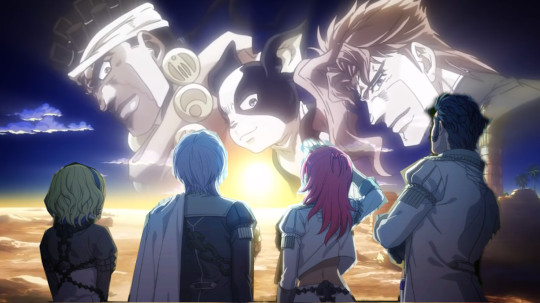
I recently finished the Cindered Shadows DLC and decided to once again write about my impressions, don't worry though, this one isn't as long as the previous ones. Spoilers: I think this is as good as fire emblem is gonna get for a while.
1) No Agarthans, thank GOD
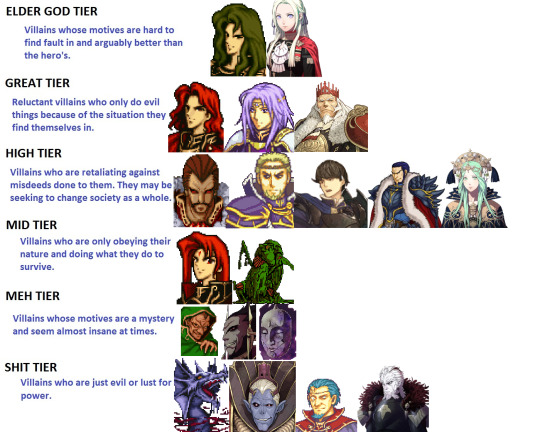
A story as old as fire emblem: There's an interesting human villain with down to earth motivations or obsessions, but in the large scale of the story they're overshadowed by a supernatural being who wants to destroy the world for no reason other than "they're just evil". This is Edelgard and the Agarthans, Arvis and Manfroy/Loptous, Rudolph and Duma, Ashnard and Ashera, Walhart and Grima... you get it. This shit sucks to put it bluntly. Having these stereotypically evil bad guys who are clearly evil is one of the main things that brings down the plot of any fire emblem game. I'm of the belief that they should kick out these supernatural villains and just leave us against the human villains, the one's with actual ideals and beliefs other than "hurr durr, destroy the world".
And then there’s our villain for this DLC. Now yes, it feels like they recycled a certain professor from the Harry Potter series, but I like that he is "The" bad guy for the DLC, he's not being controlled by anyone. He's obsessed with Byleth's mom and in-game this makes a lot of sense. If Byleth, who is incapable of communication, can drive people crazy for them just by existing then just imagine a Byleth who can actually talk. Her "waifu" charms must be off the charts, so I can't blame this guy for being obsessed. More importantly he's not being controlled by the Agarthans, he's not being played by anyone. He's a man who's lived a righteous life, he took care of a lot of people who all love him but ultimately decided to use them for his own gain and his own obsessions. As far as FE villains go... He's good, honestly, great job Intelligent Systems, I expected a lot less.
2) Reduced avatar wanking
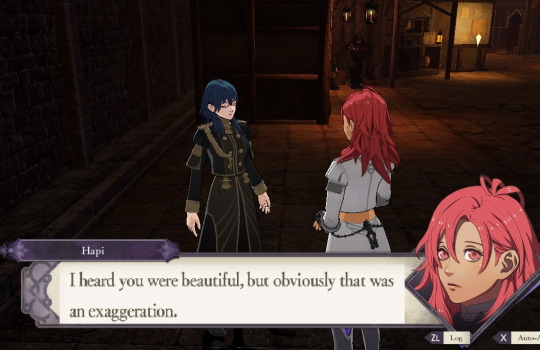
Shots fucking fired
Sure, Byleth's mom is a main focus of the plot, and Byleth is the one who sets the plot in motion, but rarely does it feel like the game is going "gee Player, you're so great, you're our god, we all love you and want to marry you". Byleth still plays a large role sure (unfortunately) but it still feels like this is the story of Yuri and his gang with Byleth being their strategist which is, idk, way better than the idea behind the main game? The one where Byleth turns into a literal god, gets every achievement of the army attributed to them only, has every other conversation remind us how glorious Byleth is, etc.
In fact the dlc goes as far as having Hapi constantly belittle Byleth and even make fun of their communication skills by calling him Chatterbox (good job to the localizers, she doesn’t say this in the japanese audio). Get that teacher’s ass girl, destroy them. (Obviously I would hate this behavior if it was directed to someone else, but in this case I'm willing to make a concession).
3) Yuri's backstory
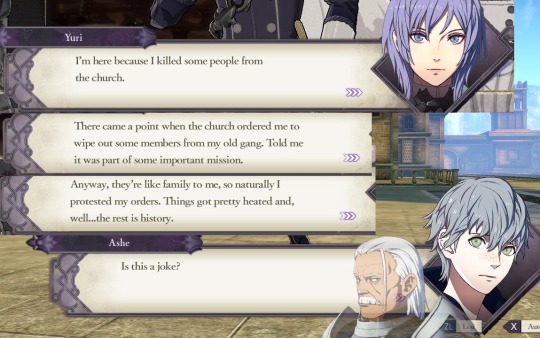
Ashe: I admire and love this man who is my only parental figure but Rhea said he's kind of bad so I killed him
Yuri: Church ordered me to kill a bunch of thieves and delinquents and I refused
You have no idea who much I love the fact that Yuri is someone who protested his orders and got kicked out of the church for refusing to kill civillians. This instantly sends him very high in my rankings. Playing through the first half of the game all I wanted was to stop and say "No, Lady Rhea, fuck you. I don't think it's very cash money for the most powerful military force in the continent to eradicate a lightly armed militia of farmers (with popular support in their locality!)" this is what true imperialism is all about! But there is sadly no option for that.
Just by telling us that Yuri is someone who was punished for saying "No, these orders are inhumane, I refuse to carry them out" that is enough for me, the game is saying "yes, we know, have your compensation price". In the end Yuri is extremely loyal to Rhea which is unfortunate but hey, at least they lampshaded one of the most glaring issues I have with the main game, so that's at least something.
4) "You've obtained all information. Proceed with the story, NOW"
Rather than wasting time forever thinking up which activity I should carry out, abyss is simply a place where you talk to the abyssal denizens to get some plot information or speculation, and boom, you're done. No running around forever, no quests, no doors that take ages to load. You can perfectly skip the abyss parts and at most you'll miss out on Edelgard's conversation with Dimiri (which is fucking hilarious) and a few rusted weapons that can be forged but that's it. Upon talking to every resident of the abyss the game will actually say you’ve acquired all information and will prompt you to go into combat rather than assume you want to dilly dally for a while.
I actually rather like this and would not be opposed to it being the philosophy behind future in-between segments between chapters. I can understand IntSys wanting to load in a ton of features like a sauna and fishing to rack up excitement for the game, I know I was excited for fishing, but when these activities have rewards tied to them, replaying becomes kind of a chore, "aw geez, I have to fish 69 fish to reach professor rank A+ AGAIN" (I actually had to when trying to get the piss screen from clearing maddening). Getting only some conversations and a bit of context for the story, that's... pretty good honestly, I liked this better than the monastery and better than My Castle. Throw in some skits with multiple characters at once and I’m gold
(seriously how come there’s no scenes with the three of the bros, Dimitri, Sylvain and Felix all hanging out together, the fact that a third character never shows up in support conversations is fucking bad)
5) Sometimes less is more
I've extensively complained about three houses already but bear with me. Yet another thing that infuriates me about the game is the extensive amount of work it required. I truly do think that if they had released only the blue lions route and left everything else in the plot as mysterious and unexplained loose ends left entirely up to speculation, that'd be a great game on it's own. Instead I have to see all the hard work that went into making the other routes only so that, in the end, they just had me going "well it was ok I guess". Every scene in the game requires work, many hours of coding, writing, voice acting, sound editing, making sure the models don't look too messed up, bug testing, etc. The amount of work that went into three houses was brutal regardless of what you think of the final product, yet a lot of people didn't even bother playing through all of that. So yes, I honestly wanted less, give me a more concise game rather than spreading too wide and ending up thin.
Cindered Shadows on the other hand is concise to a fault to make up for that. The story is pretty straightforward and leaves no loose ends to itself, there's no anime cutscenes, no supports (within abyss, you can support them all in the main game). There's even that very awkward sacrifice scene where some characters are having their life and blood drained from them yet the visual representation we see is just them standing around like normal, with Yuri even doing that hand pose he does all the time instead of squirming in pain or something. It's very awkward looking, objectively not good, but it gets the point across and doesn't make me go "wow you put in all this effort for nothing" because the whole thing is also fairly short (5 to 10 hours in hard mode).
I know, it sounds like I'm shitting on the dlc, but the point is I'd much rather get something short that leaves me satisfied than something like the main game that makes me go "this could've been so hecking gooood if they changed X" for the rest of my life.
6) The gameplay
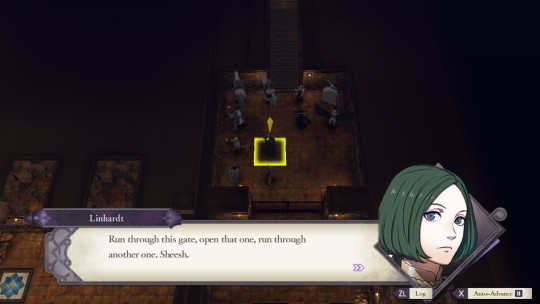
Chapter 4 is my favorite mission in the whole game
They made Hard Mode good. I previously said maddening was the one difficulty where this game made sense, but this one achieves perfection with just hard mode. This is because the team actually knows what you have. In the main game there's all sorts of variables to account for due to the large amount of player expression that is possible, you can reclass anyone into anything and throughout many lucky or unlucky level ups, maps can be entirely different based on that rng and choices. Here though, your characters already have solid bases starting at lvl 20, and you can't reclass too much so the devs know exactly what you're working with and can plan accordingly. Beating the maps feels incredibly satisfying not just because the objectives have more variety now, but also because you feel like you found the right way to use the tools you were given. This is why the first few chapters of any fire emblem game often feel so good, because the devs know exactly what you have.
Not that I think player expression is bad! It's very satisfying to warp skip chapters and to use broken units like battalion vantage+wrath Dimitri as these things make you feel like you've truly subjugated the game, but it takes some time for those things to really take off. There's a time to reap and a time to sow, and the sowing time can get pretty dull sometimes but that's what makes the payoff feel worth it. Still, for a short experience like cindered shadows is, this style just fits perfectly, plus chapter 4 has quickly become one of my favorite chapters in the whole game, along with chapter 6.
7) In The End
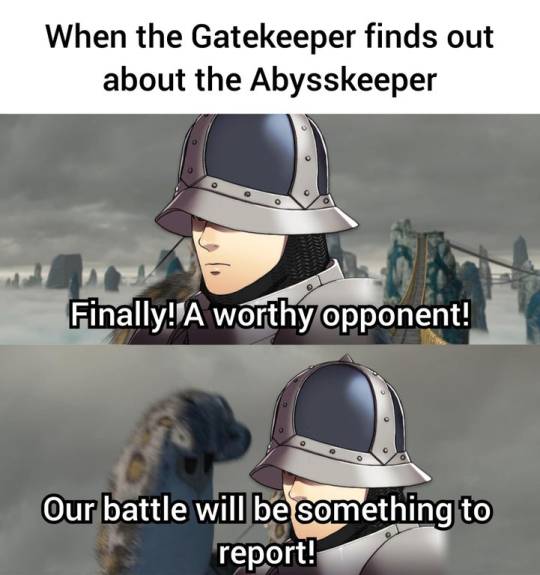
Idk folks, I just like it. If you just want more adventures with the three lords, this is it.
If you’re looking for any excuses to avoid this I'd say the better ones are: maps are reused from the main game (they work much better here though), it's 10 hours at most so it's price-to-cash ratio isn't very good with the expansion pass being $30, and also the Abysskeeper feels a bit TOO winkwink nudgenudge to me, especially since Gatekeeper was popular enough to make it into Super Smash Brothers. Like yeah bro, we get it, we all love Gatekeeper, you didn't have to do this.
I also like that they finally gave Dimitri a semi-problematic quote where he says he kinda likes the idea of poor people living underground out of sight, I think it’s a very rich-white-boy flaw to have and not entirely awful given his life experience up to that point. And yes I do think he has no flaws and is entirely unproblematic in the main game, “feral” as he may look it doesn’t seem like he goes around killing civilians or doing anything other than busting up imperial troops which is kind of justified since they started the invasion, on top that he’s the strongest unit in the game and the most chill and honest ruler once he calms down, so little dent in his record that’s irrelevant in the large picture is indeed welcome.
Overall though, after being so massively disappointed by the Fates DLC, so much I didn't even bother with the ones for Echoes, I certainly like what I'm seeing here and that's a good sign, bravo Intsys.
8 notes
·
View notes
Text
Part 10: Rage Against the Patriarchy
Let’s face it: the Kingdom Hearts series has always had something of a woman problem.
A number of strong Disney heroines like Jasmine and Megara were wimpified, Aqua in BBS was a powerful fighter but a weak character without the kind of arc her male friends got, and I already covered the issues that plagued Namine and Xion. And by Kingdom Hearts III, things had only gotten worse, as more Disney heroines all the way up to fucking Elsa weren't given their due, Aqua was finally given an arc only to have it rendered meaningless all while her powerful fighter status got compromised repeatedly, and even Organization XIII's resident badass bitch Larxene was revealed to be motivated by feelings for a man.
But when talking about how the series failed its female characters, there's one female character that stands in a class of her own, and that's the original female lead of the KH Trinity herself: Kairi.
Kairi was the emotional heart of the KH Trinity. She is introduced very early into the original game and through several interactions we get to know her and how behind her bubbly front she has deep anxiety over her life changing and the possibility of losing her home and friends, an anxiety stemming from a traumatic past that she might remember a little more of than she lets on.
After she disappears during Destiny Islands' destruction, she occasionally appears to Sora to provide insights or advice. That's because her heart took refuge inside of his, and she is consciously sharing his journey with him. Riku and many stupid, sexist players identify her body as her, claiming that she's "in a coma" for most of the game and needs to be woken up. But the point of the story that Keiko Nobumoto finalized is to challenge you to look past this kind of objectification and consider the spiritual reality that Sora learns: hearts are who people are in the KH universe. Sora doesn't need to save Kairi because he already did from the start, just by being such a close friend to her and connecting his heart to her's.
And after the "Kairi's inside me" (heh) revelation is made, Kairi actually saves Sora three times in a row! She stops him from getting his head smashed in by Ansem, she refuses to believe he's gone after he disappears which allows him to hold on to his feelings as a Heartless, and then she shields him from the attacking Heartless with her own body, an act which allows him to regain his human form. That's no mere damsel in distress!
Really, the only quibble I have with Kairi in the first game is that she isn't allowed to go back to Hollow Bastion for no good reason during the big Oathkeeper scene. That was stupid and awkward, that scene really should have taken place at Hollow Bastion before going to End of the World. But otherwise, Kairi was a fully-realized, three-dimensional character with her own emotional growth. The entire ending FMV even focuses on her and how she's learned to cope with a changing life and separation from her friends thanks to the lessons she's learned about the unbreakable connections of hearts from her journey inside of Sora.
But it was all downhill from there.
Kairi is still good in COM and KH2, but not to the same extent. The idea of Kairi is a powerful one in COM and drives the entire story, but Kairi herself never makes an appearance until the end credits of the 3D remake, and I wouldn't mind so much except that Riku gets his own playable story mode in the game which sets a bad precedent going forward.
In KH2, Kazushige Nojima's writing caused Kairi's personality to be flattened mainly to just 'love interest'; she's like a two-dimensional shadow of Final Fantasy VIII's Rinoa Heartilly. The pacing for her appearances is also sporadic and mainly confined to the last stretch of the game, and she's needlessly kidnapped by the Organization after going to Twilight Town when she could have stayed around longer and developed her character more. Also, would it have killed them to give her a combat AI? Or explain where her new Keyblade even came from!?
But with that said, she's still a likable character who is spirited and brave, she makes a lot of new friendships like with Pluto, the Twilight Town kids and her own Nobody Namine, she effectively shows her maturity since the first game and even has some small development about learning to stop waiting after a certain point and actually take action to make what you want happen. Most importantly, she still plays a major role in the story that justifies her existence. Sora still cares deeply for her and is just as motivated to find her as he is to find Riku once he learns she's been kidnapped. And she's the linchpin for the entire finale, as both Sora and Riku's reunion and their return home to Destiny Islands would not have happened without Kairi facilitating them. It really helps establish their friendship trio as just that: a trio, where all three are needed to make it work. Sora and Riku would not have survived the game without her.
Also, she served as the springboard for the manga adaptation's rendition, which fixes all the problems and gives us the definitive version of the character. Gotta appreciate that!
Unfortunately, you might remember that I mentioned Sora and Riku were shipped together by the massively vocal yaoi fangirl community, and they despised Kairi with a passion. This hatred spread to many fanboys too, who called her "useless" for not being an in-game fighter (hey guys, literally all of the playable characters of the KH Trinity wouldn't be around to play as without Kairi! I think that counts as a use!) And because Nomura is both a sexist pig and a shameless fan panderer, it was clear to him what to do with Kairi.
Nothing. Absolutely nothing.
She isn't actually in Days, not even in Mission Mode as a playable character despite even fucking Donald and Goofy being so, and Xion's connection to her is a red herring to make her connection to Sora more shocking. She's only in BBS briefly - one scene as a child and then at the very end of "Blank Points' - and not given the same amount of importance as Sora and Riku. A data version of her does not exist in Coded, even though data versions of Sora and Riku and even Namine do. As I mentioned before, she doesn't show up in 3D until the last shot of the secret ending. And in 0.2 BBS, she doesn't say anything until toward the end, and is promptly shut up and told to go train alongside her former kidnapper! What the fuck!? I honestly think the most justice done to Kairi past KH2 would be the powerful medals with her image on them in the UX mobile phone game!
This is 6 games over the course of a whole decade, and there is barely any Kairi in them at all, let alone as a playable character despite her being the series' original heroine. Worse still is that when Kairi is there, her character has been rewritten by Nomura and Oka into the weak, boring nice girl that her detractors saw her as: the fire and the passionate desire to act freely whenever she had the chance is totally gone. She just lets Sora and Riku leave her behind on the islands again after specifically saying in KH2 that she won't let that happen anymore, and despite being able to wield a Keyblade she only joins the cause when some old white dude summons her to do so! Hayden Panettiere being replaced by Alyson Stoner as her voice only adds to the effect, she just doesn't have the same spunky quality to her.
And when Kairi isn't around? She is pretty much never talked about, or even thought about, by her supposed friends Sora and Riku. Per the sexist cliches of shonen writing and the desire to pander to the fans, the Destiny Trio became a Destiny Duo, with Sora and Riku managing just fine on their own without needing Kairi, their bromance was emphasized as the most important thing in each other's lives ad nauseam. This misogynistic brand of queer-baiting worked all too well, with fans continuing to support Sora and Riku as boyfriends while condemning Kairi as a boring, useless character who oughta just die already.
Well, Nomura sure did continue to listen to these fans...
7 notes
·
View notes
Text
Teachers thoughts: what is your intention for the New Year?

Esther Ekhart - journey towards relaxation
All I desire at this phase of my life from my yoga practice is for it to relocate me in the direction of being my most kicked back, open, existing, kind self feasible in all situations off the floor covering. Yoga for me can be meditation, a solid flow, a long centering grounding Yin session or just walking in nature existing to my breath. Knowing what to do when to aid me be my most loosened up self is the journey.

Nichi Green - being here now
My emphasis currently is corresponding in my practice. I can conveniently obtain sidetracked which yoga exercise assists with extremely. Whether my technique is Vinyasa design, Ashtanga or Yamuna I'm hopping on my floor covering each day just to tune right into my body and also greet. I'm also working with Handstand which has created a whole lot over the last year as I've got stronger in my core as well as top body. I attempt and do it everyday which is invigorating and also I love being upside down.
What I wish to take with me into the New Year is a feeling of existing. I lately saw a terrific interview with the star Bill Murray that, when asked what he wanted, said' to simply be here regularly. To be actually present.' This reverberated massively with me and also I've embraced his little rule of 'Return Bill' to advise me.

Irina Verwer - authenticity
I love to begin my everyday practice and also my courses with an intention - and also setting an intention for a new year is a wonderful way to open to assess what is functioning, what isn't and what needs some great tuning or reformation. My recurring purpose is to be authentic. This beams with in every choice I make. It assists me to be open, to connect with myself and others on a much deeper degree, to take care of myself, to relax, to consume the foods that really feel excellent to my body and also to pay attention before talking. Desiring you a really joyous New Year!
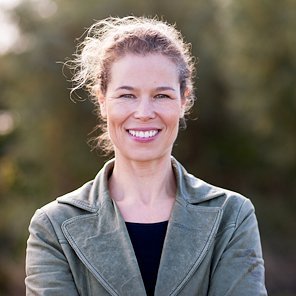
Sandra Carson - offering the most to myself and also my world
Intention for me is what distinguishes the technique of yoga exercise from any type of other kind of workout or motion technique. I locate my practices have always been the most powerful when I established a purpose. If I don't set an objective of any kind of kind, I end up just doing the asana and also moving and taking a breath. There is absolutely nothing wrong with that, however it leaves my practice a little completely dry and also not really satisfying.
An objective for me can imply to address something physical, psychological or emotional. It can likewise be an offering to a person or something. It actually depends upon where I remain in my life what purpose I establish, when I am struggling or not in an excellent room, I require to remain near to myself and also will set my objective on something more individual. When I really feel balanced and clear, I established my intention as an offering.
So my method usually revolves around the inquiry: what do I require to resolve to be healthy and balanced in my body and also mind? Just how do I require to practice in order to see myself, to understand and also feel myself far better? Just how can I relocate a way that opens up rigidity in my body and also to get strengthens where I really feel weak? Exactly how can I be much more open, kind, loving as well as understanding and also less narcissistic?
My objective is the driving pressure that aids me to connect to myself and also to attach to the globe around me with even more understanding and also clearness. Currently in my life, with all the ups as well as downs that come with it, I have actually been really feeling a change in myself. In general, I am extremely satisfied and also happy for where I am and I really feel quite satisfied, both in my physical and also spiritual method. Although there is constantly function to be done, I feel my energy moving away from myself and I am concentrating much more on what it is that I can offer to the world. The globe is a large area as well as 'supplying to the globe' may come across as a lofty or grandiose effort. For me, 'the world', simply means my spouse and children, my neighbour, my pupils and pals, the cable car driver or whoever I run into in my life. How can I remain in the world in a manner that does not only make me feel happy as well as meaningful, but additionally in such a way that offers to others?
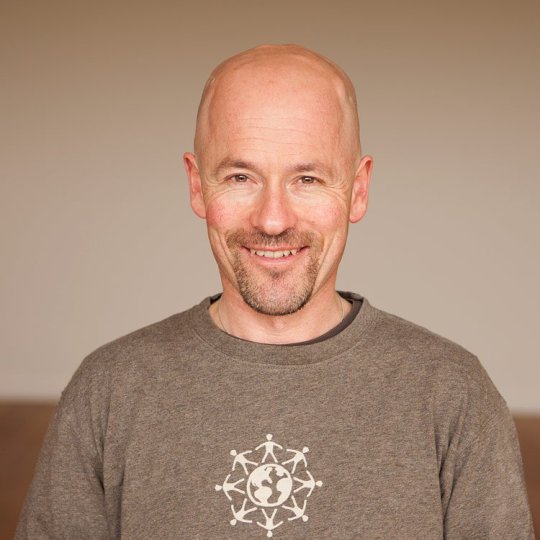
David Dodd - presence and exploration
I work at two degrees in my own method when it pertains to intention. At a general level I constantly collaborate with the objective to merely 'Exist'. I often tend to spend a great deal of time in my head, so for me existing means most importantly bringing my attention to my body and right into the breath when I practice. This basic purpose has offered me well over the years to ground me each morning before I go out as well as do my point in the world. I will certainly remain to work with it going forwards both during technique as well as off my mat.
At a second degree I usually function with several particular purposes with regard to the interest I give my physique. For example, presently I am exploring what is going on in my butt muscle mass when I raise up right into back bends, and also the differences in feeling when I loosen up as well as re-engage these muscle mass in different methods as well as at different times in the pose. The various strategies for asana technique give different viewpoints on what is the 'appropriate means' to exercise in this respect, so I am just spending some time discovering this for myself. I invested a few months doing this a couple of years back and I am discovering equally as much - and having as much enjoyable - the second time around!

James Reeves - rest in the moment
My life's purpose is to rest in my interconnected integrity in all minutes of life so my everyday and yearly intents constantly support this. This year my intent is to remain to instruct and expand in my research and understanding, whilst taking ample break for my own meditation as well as technique. It's so simple to obtain shed in all the 'doing', all the research study, and all the 'understanding' as well as forget that often we just require to relax back right into the minute. Here's to a large New Year!
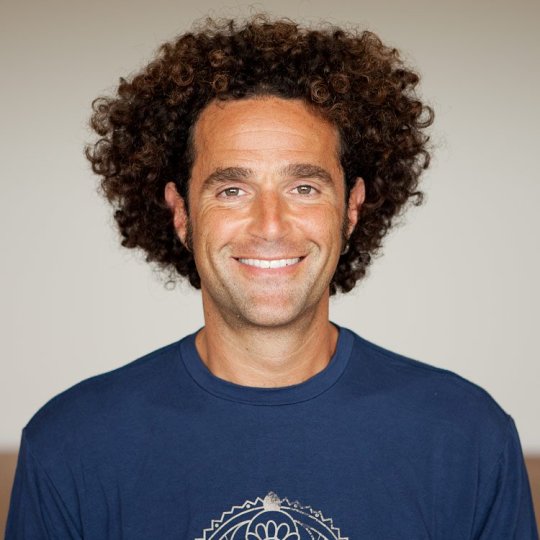
David Lurey - present in the state of love
I am maintaining with a clear purpose to be extra conscious in my asana method in the hope that it performs to the rest of my life. I am not so thinking about becoming more versatile or more powerful in my presents these days, but a lot more concerned with maintaining existing and also alive in every circumstances. It entails 'more' body recognition however is much more focused on involving my mind in the moment.
The intention of being extra conscious is to keep me much more in the existing minute where I believe Love to exist. I intend to be in mental as well as physical state of love as long as feasible. Oh ... as well as a couple of swimsuit handstands too!: o)
Francesca Guisti - being open to what unfolds

I don't truly assume concerning objective when I hop on my floor covering. It's not regarding 'What I want to accomplish' or' just how I intend to really feel' with my method. It's a lot more about the energy degree that I have at that specific moment, as well as how it advances as I enjoy my technique. Sitting as well as Pranayama have a profound result on my energy, and also typically afterwards I am prepared to move my body. If there is an intention, it's simply the deep understanding that once I get on my floor covering I am always a lot more in tune with my body, with my breath as well as with my mind. Clearness and equilibrium come whether I put my intent there or otherwise. I invite my fellow specialists to keep their intent light: being open to what unfolds is the most effective intention!
Anat Geiger - understand the underlying actions

What constantly helps me is to ask the inquiry: what is the purpose behind the act? I think it is the determination to please even more than our hungers that matter, our willingness to comprehend that every single action we take have consequences that surge via our lives and also the lives of others.
I think that a person of our greatest troubles is what I call 'objective shuffle': we think we have one inspiration, while deep inside there is another, more complicated and commonly much less rather intent moving the engines.
I frequently state in classes that I believe the yogi's most useful prop is sincerity. When we absolutely look inside ourselves as well as truthfully access what is our inmost intent, we will certainly concern recognize our actions and its results better, as well as we will be able to much better affect them, if that is our choice.
Resolution and intention
Rather than making a New Year's 'resolution' - which, by its very meaning, can be stringent and uncompromising, just how around making an intention rather - something that you can function towards, that doesn't have a 'success' or 'fail' outcome attached to it.
Find your intention
Shoot the intention arrowhead - locating our real motivations as well as looking them right in the face is sometimes the finest means to reconnect with our technique and also our life. Work to locate your true intentions and also position them where you can reach them in this half an hour Vinyasa Flow with Anat Geiger.
Have a pleased and serene Brand-new Year!
Love, EkhartYoga x
n. b. This post, has been lately updated.
#asana#bikram yoga#hot yoga#meditation#pilates#pranayama#restorative yoga#spiritual#yoga#yoga for beginners#yoga poses#yoga practice#yoga works
1 note
·
View note
Text
Final Fantasy Type-0 review: Depression central
If there’s one Final Fantasy subseries whose fate gets me feeling down, it’s the Fabula Nova Crystallis series, a novel and ambitious concept based around various games and stories of different settings and casts of characters, but sharing common themes and mythos, putting them in different contexts in each. While a fascinating idea, it ran into nothing but trouble with each of its entries, with Final Fantasy XIII and its sequels being very divisive, to say the least, Final Fantasy Versus XIII running into an infamously extended development hell, only to finally emerge as Final Fantasy XV, now almost completely separate from its original concept, and the final big entry, Final Fantasy Type-0, vanishing until 5 years after its announcement in 2006, as a PSP exclusive that only came out in Japan, a rarity for the series when it comes to its higher profile spinoffs. Thankfully, in 2015, Type-0 got a remaster on the PS4, Xbox One, and PC, finally allowing other audiences to enjoy it. Was it worth the almost 10 year wait? Well, that’s something we’re about to find out now.

Story:
Final Fantasy Type-0 takes place on the world of Orience, divided into 4 great nations blessed with Crystals: the Dominion of Rubrum, a place for the study and teaching of magic granted by the Vermilion Bird crystal, the Kingdom of Concordia, a female led monarchy able to communicate and control monsters and, more importantly, dragons, and home to the Azure Dragon crystal, the Militesi Empire, a technologically advanced state able to produce great machines of war known as Magitek Armors, or MAs, through the power of their White Tiger crystal, and the Lorican Alliance, whose citizens are much larger and powerful than any other in Orience thanks to their more direct connection to their Black Tortoise crystal. Orience is, unfortunately, not a place of peace, with each of the 4 crystal states wishing to unite Orience under them, and making plenty of attempts to in the past. The motive behind this is the legend of the Agito, a messiah said to appear during Tempus Finis, an apocalyptic event prophesied in the somewhat dubious, yet widely believed, Nameless Tome, with every crystal state seeing it as their divine duty to create Agito, to the point of Rubrum training so called Agito cadets from its brightest and most magically adept citizens.
The story opens with yet another war being started in the year 842 by Milites, whose emperor has been deposed by the brilliant and ambitious Imperial Marshall Cid Aulstyne (Final Fantasy games have a tradition of having a character named Cid somewhere, and finally, he made it as main antagonist), who immediately sets out to attack Rubrum. What would otherwise be a “normal” invasion quickly turns disastrous for Rubrum when Milites unleashed a new device called a crystal jammer, which cuts Rubrum’s legionnaires from their connection to the crystal, rendering them helpless before the Militesi invaders. Even worse, Milites also deploys a l’cie, a human chosen by their nation’s crystal to become its direct servant, in exchange for immense power and near immortality, the use of which in warfare was mutually banned by each of the 4 nations. Just when Rubrum seems doomed, the mysterious Class Zero arrives, 12 cadets who are unaffected by the crystal jammer, raised by Rubrum’s even more mysterious archsorceress, Arecia Al-Rashia, who proceed to liberate the capital, Akademia. Now, with the addition of two promising but otherwise normal cadets, Machina Kunagiri and Rem Tokimiya, Class Zero becomes a vital part in Rubrum’s efforts to reclaim their lost land and defeat Milites, once and for all.
To just come out and say it, the story’s biggest weakness is the cast, or, more specifically, its use of the cast. While the playable cast alone is certainly large, at 14 characters, and the supporting cast only grows from there, almost nobody gets proper focus. The main 12 members of Class Zero, named after playing cards, consists of Ace, Deuce, Trey, Cater, Cinque, Sice, Seven, Eight, Nine, Jack, Queen, and King, and despite being the “proper” members of Class Zero, they all only have a few character traits each. Trey is a knowledgeable type that tends to ramble, Sice is an arrogant loner, Nine is a violent muscle head, Cinque is nice, but downright weird, and so on. While after a while they all grew on me, it’s still pretty unsatisfying, especially when Ace, the face of the game, gets neglected just as badly. The supporting cast gets it even worse, as outside of Arecia and Class Zero’s commanding officer, Kurasame, most of everyone else that’s notable either has minimal at best story presence, or doesn’t show up in the story, period, being relegated to sidequests. Ultimately, the most focused on characters are the two “normal” people in Class Zero, Machina and Rem, which kinda makes sense, giving a more grounded air compared to off how putting the others can be to begin with, but even they don’t work out quite well. While Rem is fine, she doesn’t do very much interesting with the time she gets, while Machina, on the other hand, is very, very unlikeable to the point of hurting the story, whether it be his own cold attitude or broodiness to put the usual RPG protagonist stereotype to shame, he ends up way more unsympathetic than near anyone else in the story, even most of the antagonists. While the cast overall is definitely flawed, though, they’re definitely entertaining at a lot of points, whether they come from the main cast, mostly Trey or Cinque, or from some of the side characters, mainly the extremely greedy Carla and, most memorably to me, the paranoid, bombing throwing Mutsuki.
Since the story doesn’t focus on the characters very much, the main focus is instead the war itself. While it definitely has a few twists and turns, especially starting in chapter 4, overall, the battles and events of the war aren’t the most interesting subject by itself. More interesting is the elements around the war. This is by far one of, if not the darkest game in the franchise, and it doesn’t shy away from showing just how messed up Orience is. Rubrum’s main strength comes in the form of its Agito cadets, meaning, teenagers, as young as 14, at that, and the tactics the military uses means they tend to die in droves. Even when it’s technically pragmatic, between magic proficiency peaking at teen years and decreasing with age, plus not having many other means to resistance, it’s still very uncomfortable, and keep in mind, this is what the good guys, or the relative ones, get up to. Milites, meanwhile, is all too happy to deploy superweapons, such as literal nukes, and its soldiers are disturbingly fanatic, being more than happy to massacre towns, and even refer to Class Zero as demons. Class Zero themselves were raised to be soliders, and feel almost nothing in battle, and Rubrum’s leadership are paranoid and petty, to the point of the military commander actively trying to get Class Zero killed out of pure spite. Eidolons, extremely powerful monsters able to be summoned by mages, demand the lives of their summoners, and there are outright suicide squads of cadets who are only meant to summon more powerful Eidolons. Additionally, a very important plot point is that the crystals automatically erase the memories of anyone who dies from everyone’s minds, to the point Rubrum’s citizens need to wear dog tags just so it can be confirmed they even existed after they die. While they try to justify it as a blessing from the crystals that allows people to move on and not be held back by the dead, all it’s done is completely desensitize Orience to death, and having characters casually talk about being informed of their friends or family dying, and not feeling a single thing, is pretty disturbing, especially when it’s named character involved. It does a very good job of showing how constant warring and lack of reverence for the dead has corrupted this world, even when many of the characters affected still remain sympathetic.
Unfortunately, the biggest flaw of the story to me is that there simply isn’t a lot of it to be found, at least in regards to the main story. While the game is comprised of 8 chapters, that’s more than a little inaccurate, as half of those consist of a short introduction and a singular mission, rather than the 2 or 3 missions in the rest of the chapters. The story only really gets moving in chapter 4, and even then, many important points aren’t addressed until chapter 8, which is a downright bizarre and sudden change of subject and tone compared to the rest of the game, to the point a second playthrough is required because of how many holes are left otherwise, and even then, it can be a bit difficult to figure out just what is going on. The biggest achievement of the writing, on the other hand, is the lore of the setting. Orience is a fascinating world, with a detailed history of each nation, plenty of info to find on the various characters, and examinations of the various enemies of the game, all stored in a book in the hub called the Rubicus. It’s also quite interesting seeing the perspective flip compared to Final Fantasy XIII; instead of l’cie “merely” being granted the use of magic, and quickly going through their usefulness, at least by their masters’ consideration, along with the main cast being comprised of them, l’cie in Type-0 are near demigods who often live hundreds of years, and are just as fearsome to the party as to everyone else, for instance. Overall, though, while there are certainly many problems with the writing, I can’t help but say it works quite well regardless. Even with the limited time for both the story itself and the characters, it still builds a cast worth rooting for throughout the horrible situations, and an effective atmosphere that’s quite good at leaving you feeling somber. Moments like the entirety of the opening chapter, showing the utter devastation inflicted on Akademia in a mere three hours, and the various costly, large battles are very effective moments, and the ending is easily one of the saddest endings I’ve seen in a video game, for all the right reasons. Even the final chapter, odd as it is, has a lot of cool revelations and setpieces to me, at least now that I comprehend it.
Gameplay:
Type-0 is an action RPG that has you control the 14 members of Class Zero on various missions, each one possessing a different weapon. Ace uses cards, Deuce uses a flute (I swear they aren’t all this weird), Trey uses a bow, Cater uses a magic infused pistol, Cinque uses a mace, Sice uses a scythe, Seven uses a whipblade, Eight fights with his bare hands, Nine uses a lance, Jack uses a katana, Queen uses a longsword, King uses dual revolvers, Machina uses dual rapiers, and Rem uses dual daggers. Each one possesses a vastly different moveset and playstyle, such as Cinque being slow, but strong and tanky, Sice encouraging an aggressive hit and run style of play, even getting stronger for the more enemies she defeats while taking minimal hits, Trey excelling at range to a much degree than anyone else, while being near helpless up close, and Deuce being more of a supporter, having great support abilities, while her attacks are fairly weird to get used to, though effective on their own once you understand them. Despite the huge amount of characters, they’re actually fairly well balanced, all of them having important strengths and weaknesses, and while some can definitely be better than others, with Trey in particular coming to mind, possessing absurd range and the ability to charge his shots, it’s never quite game breaking. You can have up to three characters in your party, though their AI isn’t exactly great. They can certainly distract enemies well, and will make sure to heal you if your HP gets low, they don’t tend to be aggressive, and are terrible at avoiding the attacks of most enemies more complex than your average imperial trooper, and are near guaranteed to die to bosses. Speaking of which, the main wrinkle is that, while it varies, overall, your characters are not very durable, and in fact take hits about as well as wet toilet paper when faced with most enemies. This is balanced by the sheer amount of people you have. One person dies on a mission, don’t sweat it, you’ve got 13 backups. Of course, this also encourages training them all up and learning to play them as well, which is complicated by only characters in the active party gaining experience. Leveling up, in addition to granting the usual stat boosts, also grants ability points, which you can use to purchase or upgrade command or passive abilities and moves.
While just attacking enemies normally is decently effective, it can put you in unnecessary danger, and while you do have items like potions you can use to restore your health quickly, the most efficient way to fight is to use breaksights and killsights. Every enemy has at least one attack that leaves them vulnerable for a short time either before or after using said attacking. Hitting them during this period will trigger a break, or, if their health is low enough, killsight. Breaksights take a good chunk of their health away and stuns them, giving you a chance to attack them freely, while killsights just kill them outright. This one mechanic adds a lot to the gameplay, encouraging you to learn enemy patterns and attacks to see when they are vulnerable, and getting the timing down can make otherwise fearsome enemies easy to take care of. Of course, some enemies won’t take this very well, and may counterattack or even go into berserk states after recovering from breaksights, so you still have to be careful. Every character has 4 commands: regular attacks with their weapons, 2 slots that can either hold abilities or offensive magic spells, and a defensive command, whether it be the cure spell to restore health, putting up a magic wall to nullify some attacks, or just flat out blocking, which, while still causing you to suffer damage, prevents being knocked down, letting you score breaksights easier than if you were to simply dodge. Magic can be upgraded by harvesting phantoma from dead enemies, coming in various types like red for fire magic, green for defensive magic, and purple for unique spells. While powerful, magic usually takes a large chunk out of your magic points, meaning it’s better to save it for more dire situations, though harvesting phantoma restores small amounts of MP. As for equipment, aside from weapons, you have access to accessories that do things such as increasing HP by a certain percentage, giving immunity to status effects, or raising defense, though everyone can only have 2 accessories at a time. You also have three different squad commands: triad maneuver, which simply causes the party to do 3 powerful, rapid attacks, Eidolon, which summons an Eidolon you can control for a short time, in exchange for KOing the character that summoned it, and Vermilion Bird, a powerful spell that, to actually become powerful, has to be upgraded using crystal shards, which, while fairly easy to get most of the time, aren’t very numerous.
Type-0 uses a mission system, throwing you into various locations to complete objectives, though it usually equates to to reach the end of the area and kill an enemy commander. Most locations are pretty linear, though they all have a few side areas you can go to, usually for more items. You get graded based on how fast you completed the mission, how much phantoma you harvested, and how many party members got KOed during the mission, with getting the best rank on all three categories getting you an S rank, which gives a bonus item. Beating each mission on a difficulty above easy also unlocks other bonuses, whether they be additional items up for purchase or unlocking new spells or Eidolons, or just flat giving you a rare item. Completing missions also gives you money, with more the higher the difficulty and the higher your rank. Speaking of difficulties, there are 4 of them: cadet, which is just easy mode, officer, normal mode, Agito mode, which is a hard mode that makes every enemy 30 levels higher than on cadet and officer, and Finis, which is only available after completing the game once, and is, just plain absurd. All enemies have their levels increased by 50, they’re in permanent rage mode, causing them to move twice as fast and hurt twice as much, and you’re restricted to only being able to use one person per mission. It’s not much worth the effort. Aside from completing missions, your main source of items, magic, and Eidolons is from completing special orders, optional objectives that can pop up in various areas. While there’s various generic, white orders that only give items at the end of the mission for doing stuff like not getting hit for 30 seconds or not using magic for a few minutes, there are also specific, red ones with more specific objectives like taking out certain enemies, that give out better rewards. The main problem with accepting them is that, if you fail to complete them, you risk instant being killed over it, though you can avoid it you’re fast enough, as it’s delivered through portals on the ground.
In between missions, you’re allowed to explore Akademia, chatting with NPCs or party members, or engaging in “free time events” which are either conversations with random people, or cutscenes that tend to have much more interesting information. You only have a limited amount of hours until the next story mission starts, with each event taking two hours away, though time doesn’t pass just running around and talking to people without events. While a neat concept that could easily be like Persona, in practice, it doesn’t add much. While you can get some interesting information at times, and doing events also gives you items, it’s not very in depth otherwise. Even the sidequests with the more prominent side characters just consist doing their events whenever they’re available and doing a sidequest for them, eventually getting admittedly very good bonuses at the end of their little storylines. The other thing you can do with your free time is go out into the world map, where you can visit extremely small towns, get into random encounters, visit dungeons, and... not much else. While the world map isn’t tiny, there’s just not much to find. While there’s many towns, they are, again, tiny, only consisting of a single small area with a shop or two, a sidequest, and a little unofficial side quest to get a l’cie stone, which can be traded into a certain NPC to unlock lore entries in the Rubicus. There’s just not much of interest, and you’re very heavily restricted in where you’re allowed to even go on the world map, only being able to go to areas officially reclaimed by Rubrum, or that are the destination of the current story mission. Only in chapter 7 do you finally get some kind of freedom, to the point of being able to gain an airship to allow easy traversal of the world. Plus, most dungeons aren’t even meant to be explored on a first playthrough, with only about one or two being reasonable at that point, not that there’s even much to find besides l’cie stones and a chance at a rare item, emphasis on chance, since they’re always in a specific chest at the end that can only be opened once without reloading your save, and the chance of getting the most valuable item from them is rather low.
As for other activities, you can train in the arena, for downright piddly gains, or take on sidequests, most of which just contain of going out and defeating a certain amount of specific enemies, giving over items, and so forth. Most rewards aren’t great, but a few, namely from the more notable characters like the leaders of Rubrum, Kurasame, and Arecia, give very notable rewards. Sidequests don’t take time to do, but often require you to leave Akademia, meaning you need to weigh the time lost going out to do the quests against the time you could use doing events, which is difficult when you don’t know just what rewards either give out. When it comes mission time, though, you gotta venture out on the world map to your next destination. Speaking of the world map, along with the regular missions, there are also RTS style missions, where you, controlling a party member on the world map, help the dominion army reclaim forts and towns by taking out enemies and having units generated by controlled areas weaken said areas until you can invade them in a regular mission style. Instead of being graded on phantoma harvested, you’re instead graded on objectives completed, as occasionally you’ll get orders to do stuff like defend a fort for a specific amount of time or taking out a large enemy. While technically optional, you get bonuses for completing them beyond mission grade, such as access to “hero units” and direct control of certain areas. There’s a decent amount of these missions in the game, and they do make for an interest change of pace, but they aren’t much notable. You’re even allowed to skip participating in them, though obviously you miss out on rewards.
The highlights of the game are, rather sensibly, the end of chapter missions. Not only are they much longer than typical missions, they have much more unique settings, and, of course, bosses. This game has some very enjoyable, if difficult, bosses, ranging from the giant mech Brionac that is more than capable of wiping you out in a single attack, to the highly mobile mech of Qator Bashtar, Cid’s second in command, to several fights with the near invincible Gilgamesh (another recurring character in the series). My personal favorite is the boss of chapter 5, the dragon Shinryu, which is also all too happy to instantly kill you with most of its attacks, even more so than Brionac, and spend most of the fight enveloped in the darkness surrounding the arena you’re in, only being visible by the lights of its glowing red eyes. It makes for an amazing setpiece, and losing to it is almost more enjoyable than winning simply due to the failsafe implemented since the devs expected most players to lost, the details of which I simply cannot spoil. Finally, on a second playthrough, two new types of missions are available for you: expert trials, and Code Crimson missions. Expert trials are optional missions you can do during your free time, which you’ll likely have a lot of since events you see on a previous playthrough can be viewed again at no time cost on repeat playthroughs. While technically available in the first playthrough as well, they are way too difficult for the average player, i.e who isn’t insane like me. Code Crimson missions, on the other hand, are replacements for the end of chapter missions, consisting of you going off to do other stuff. While an interesting concept, in practice, they aren’t anything special, especially when they’re replacing the most interesting parts of the game, and they barely give any more story context either. The chapter 7 mission is the one exception, being very short, but an interesting concept and adding a bit more to the story. Plus, completing them all on one playthrough unlocks an interesting alternate ending, so that alone makes them worth a go.
As for the hardest challenges to be found, they’re a bit lacking. Aside from the regular optional dungeons, there’s one notable bonus dungeon and two notable superbosses. The bonus dungeon is the Tower of Agito, which can only be reached by airship, which consists of 5 floors where you need to fight 100 specific enemies, such as tonberries and behemoths, with plenty of chests to open in between, ending off on an extremely disappointing end boss that is just a Malboro that happens to be massive. While it certain sounds difficult, and pretty much everything is capable of one shotting you, once you get into a good pattern, it’s really just boring. Most of the time, they just spawn so slowly, and while after a while more of them come out at a time, it takes about an hour and a half at best to get through even if you’re otherwise efficient. As for the superbosses, there’s Nox Suzaku, only available in a second playthrough and onward, who has a chance of appearing whenever you harvest phantoma, stealing everything you try to harvest until it decides to go away. Aside from making it go away on its own, you can beat it up, which is quite a doozy. Instead of fighting you directly, it summons phantoms of various enemies to fight you, and while you could just defeat them all, this doesn’t do anything to Nox itself. Instead, you have to let the enemies defeat you, causing Nox to appear for a short time, allowing you to attack it until it retreats. Rinse and repeat, it’s not that difficult, and the rewards aren’t that great, so the main reason to beat it up is just to make it go away, because it stealing your phantoma is extremely annoying, especially when it can show up during missions, since you can’t just leave to fight it, and it’s entirely possible for it to flat make it impossible to get an S rank on that mission it decides it doesn’t want to leave. Not exactly a fun mechanic. The other superboss is, per tradition, Gilgamesh, in a stronger form than in the story. He only shows up on a third playthrough, at a few different locations on the world map, in the form of a portal. Entering said portals causes him to randomly select one of your characters to challenge. If you win, you get that character’s ultimate weapon, but if he wins, he steals your character’s current weapon. The ultimate weapons are kinda underwhelming, especially considering you may well have everything else done after a second playthrough, and it’s annoying getting specific people picked, but it’s actually a fun and fair fight, if easy to figure out.
Overall, Type-0 has some of the tightest gameplay among all the Final Fantasy spinoffs, and is the main thing that holds it together. It has a fast, hectic pace to it, interesting enemies to tackle, and a wide variety of people to try out. Really, the main criticism I have is the actual missions you have with which to try them out. The other main story missions aren’t much to look at, and same goes for the expert trials and Code Crimson missions. I’m sure this is at least partially due to originating on the PSP, and having to deal with its limitations, something that’s about become a theme in this review. Overall, though, it’s still more than satisfactory.
Graphics:
The visuals of Type-0 are a very mixed big, unfortunately leaning more towards negative. More than anything else, they make it very apparent that Type-0 was originally a PSP game. While the members of Class Zero themselves have decent looking models, if rather unemotive, everyone else, except a few important characters like Arecia, are much lower quality, especially the faces. Here’s a comparison between Ace and Carla.
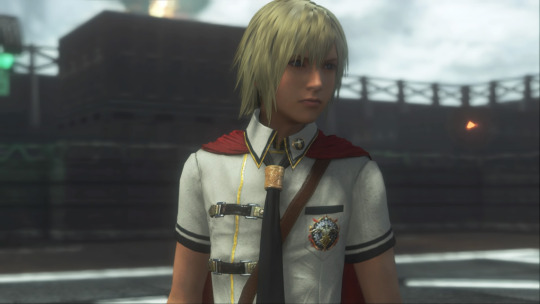
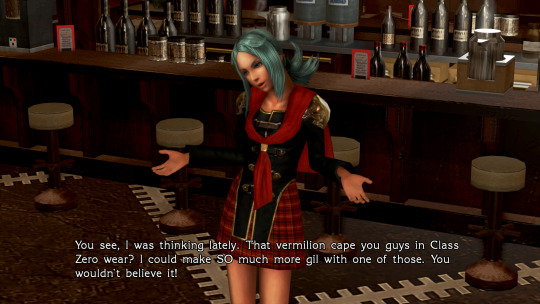
The textures don’t fare much better, looking very blatantly stretched and blurry, especially on the world map, where bridges are just one long, hideous texture. Most locations outside of, again, the end of chapter missions don’t look anything special, and so many areas are just reused over and over. You go into a town, it’ll look like every other town, at least of that region. You invade a fort, it’ll look like every other fort. Repeat for almost every mission in the game. Thankfully, the big story missions look quite impressive and creative, my favorites being chapter 5′s, taking place on frozen clouds that end up near breathtaking, and especially the setting of the very final mission, which is, to avoid anything too specific, downright insane, in a good way. Another positive are the enemy designs, more specifically, the actual monsters, with enemies such as bombs and flans resembling their earlier FF designs much more than most modern entries. Unfortunately, there’s just one problem: the actual variety of enemy designs is rather lacking, with the majority of enemies being slight alterations or palette swaps. It’s a more minor point than most, but still something. The original enemy designs are quite inventive though, and overall, this is a game that excels more in general design than actual fidelity, like the spiraling Concordian capital surrounded by a sea of clouds.
Sound:
The music of Type-0 is plain great, as is usual for the series. The boss themes especially are fantastic, along with the main theme, The Beginning of the End. It also sounds quite distinctive compared to most of the rest of the series, having a greater focus on metal, fitting the more modern aesthetic. The English voice acting, on the other hand, isn’t quite great. It’s pretty obvious the dub was a rush job, considering Type-0 lacked the simultaneous localization process of the main series games, resulting in it being very lackluster overall. There are some notable voice acting names in it, like Cristina Vee as Cinque, Bryce Papenbrook as Machina, Danielle Judovits as Carla, Cassandra Lee as Mutsuki, and even Matthew Mercer as Trey, and they all do good jobs, but the rest of the cast varies, especially Class Zero itself. Ironically enough, the side characters tend to have much more solid performances, with special props going to Steve Blum as Cid, giving a very menacing perfomance, as well as other characters like Aria, Class Zero’s orderly, and Kazusa, the resident mad scientist. Corri English as Sice and Heather Hogan Watson as Queen also fair quite well. Beyond that though, the performances can be rather forced, like Nine and Cater, or just weak overall, like Rem and Deuce. This is not helped by the normal, in game cutscenes themselves, with their structure causing many long, awkward pauses nearly every sentence. It does, however, improve as the game goes on, to the point of the final cutscenes not being hurt by it near at all.
Conclusion:
Overall, this is a solid recommended by me. Even with the weakness of elements like the graphics and the short, underdeveloped story, the core gameplay just holds up that well, and there’s quite a bit to enjoy in the weaker elements even beyond that. Overall, this is one of my favorite Final Fantasy spinoffs, and the fact that it will most likely never get a sequel due to the departure of its director, Hajime Tabata, makes me very sad. With that unneeded note, this shall be the last of the Final Fantasy spinoffs I play in some time. The next time the name Final Fantasy pops up as the subject of one of my reviews, it shall be about the main series. Till next time.
-Scout
6 notes
·
View notes
Text
The Regional Differences of Nier (And Why the Western Version is Better)
Nier (2010) is one of countless games to change based on the region its released in. While the localization process is nothing interesting in the realm of video games, the extent to which Nier changes is quite immense. The significant difference between Nier Replicant, the Japanese Playstation 3 version, and Nier Gestalt, the Japanese Xbox and worldwide version, is the age of the main character (canonically and for the sake of this essay titular) and his relationship to Yonah. In the former, Nier is Yonah’s older brother, while in the latter he is Yonah’s father. There appears to be a twenty or so year difference between the two Niers, and in general this does little to affect the gameplay. Yoko Taro is on record as saying Replicant was the original premise, while Gestalt was an attempt to appeal to a wider audience, as they feared the younger protagonist would not mesh well with western players. While their fears weren’t misguided, this change has wider thematic implications that overall service the narrative better than if Nier had remained a brother.
While Gestalt is available in Japan, it’s important to note that it is the Xbox version. Japanese support was weak for the console, hence any user being hard-pressed to name several noteworthy Japanese made games that did not cater to the west in some fashion (at least overseas, because there were a surprising number of japanese only shoot-em-ups and rpgs exclusive to the Xbox). All to say, that even if this version was available in Japan, the developers didn’t make it with Japanese players in mind.
Yoko Taro is no stranger to challenging tropes in video games, and this is one of the surface reasons Nier’s age difference works between versions. Tropes vary depending on regional culture, so it is not too far-fetched to suggest a game challenging conventional game design and its tropes would change important/visible aspects of its game to challenge them. While a caring big brother is a common trope in the West, there are more instances of it in Japanese media (particularly games and other contemporary media). On the other hand, the caring father figure is a trope that, though it would not be amazingly popular in video games for another two years after Nier (thank you The Last of Us), is familiar to the average consumer. On a basic level, the big brother and father roles are functioning the same outside of a few script changes and different voice acting. Gameplay wise, brother Nier has a better excuse for not having the ability to wield greatswords and spears than father Nier, but this doesn’t amount to much beyond a jarring absence of those weapons in the first half of the western version. As the game goes on, there is a different importance placed on the character depending on their age and relationship, and the implications for the story are greater for father than they are brother.
Our expectations for these characters’ knowledge varies depending on how old they are; we would expect father Nier to be wiser, to know more about this world than we would for brother Nier. What we would chalk up to naivety for brother Nier is then considered willful ignorance if not outright manipulation for the older one. Brother Nier is a simpler character in this regard, because he’s young, and we can only despise what he does so much before realizing he didn’t know any better. Father Nier, on the other hand, is old enough that his lack of empathy provides stronger commentary for his character.
At the root of Nier (game) is the matter of perspective: what looks good for one character is disastrous and hostile for another. The game reveals this information towards the end of the first playthrough and all throughout the second. This information then informs the player’s perspective on both Nier’s behavior and what we presumed to be hostile acts. Let’s take a look at the cutscene after Emil destroys the Aerie.
Emil is overcome with grief and sorrow because of the destruction his actions have caused. He seems genuinely concerned and remorseful after having destroyed the town, realizing all the innocent people that were surely killed in the process. Despite actions having consequences throughout the whole game, none of them up until that point have had that great of a change. From this point on, this area becomes more or less useless (and for those interested in grinding out upgrade materials, a sour sight as you wait until the next play through to grind for eggs). People to talk to, quests to complete, whatever you needed in that place is completely locked away for the rest of the play through. All that remains is a huge and empty pit.
How does Nier respond to Emil? He tells Emil, “But you saved our lives,” and goes on to explain how it was a case of them or the shades, that there was no other choice to take, and ends, almost like an order, by telling Emil, “Don’t look back.” Nier does not want Emil to think about the negative consequences of his actions, a running theme present throughout the story, usually used with regards to killing shades, where no matter how innocuous their behavior might seem, Nier will posit that there is no other choice but to exterminate each and every shade they encounter. Nier tells Emil this to keep him on his side, to influence the way Emil should see his monstrous actions. Nier needs him to believe in his cause, and there’s no room to question who’ve you hurt, or whether you are wrong.
Nier’s stubbornness persists throughout the whole game, culminating in the end where, despite knowing that the Shadowlord has just a noble a cause - in fact, probably a nobler cause considering he is the original Nier and his daughter is the original Yonah - Nier refuses to sympathize or stop himself from taking what he deserves. This isn’t to say that the Nier we play as the whole game is necessarily “the bad guy,” but that our entire notion of what it means to play “the bad guy” is entirely dependent on the perspective and player agency of that character.
It is much easier to view these enemies in simple terms as we are forced to do in the first play through, before we understand Kaine’s backstory and see how shades behave when they aren’t being murdered by the replicants. These are enemies, plain and simple. Though there are side quests and moments where this comes into question, for the majority of the main plot, up until the very end, we are meant to believe that our fight is the right thing to do. However, the second playthrough complicates this situation, and it starts to become less clear whether we should keep on going. However, Nier’s own persistent despite our own knowledge is what differentiates him from most other playable protagonists. While the player is able to make choices throughout the game, it is never during the most critical scenes (despite arguably the ending (though even then the Shadowlord must always be defeated)). Nier is stubborn and committed to the purpose he has set for himself until the very end.
Again, as a brother these actions come across just as stubborn, however this stubbornness is different from father Nier. We can look at Nier’s actions more critically when we accept that he’s consciously exerting himself and manipulating others to get the result he wants.
This becomes most clear during the battle with Devola and Popola. The sisters make the game’s point clear: Everyone has their own motives and desires driving them, and conflict happens when different characters with opposing purposes meet. It really is that simple. However, after Nier kills Devola, he tells Popola to stop. Popola responds with what might be the most powerful statement in the entire game. Her line, “Do you think I have the luxury to stop?” is particularly poignant because it invites the player to consider how important her role is and whether she could call it quits even if she wanted to. But most importantly, it makes the player question why we ourselves haven’t stopped. Why have we continued to play this game and kill these characters? Even if we separate ourselves from the characters and believe we only play to get to the end, what does this say about our behaviors and why we continue to play games at all. Why don’t we just stop? Before her phase in the battle begins, she exclaims, “No one ever stops!” She’s just as assured in what she’s about to do as Nier. While this article focuses on how Nier (the character) is changed between regions, it would be foolish not to include that this line, as it’s expressed in the English dub, does not exist in the original Japanese. In Japanese, Popola just exclaims that she’s going to kill you… Besides removing many of the implications that her English exclamation has, it really limits how deeply we can think about Devola and Popola. The English version gives a better sense of thematic ideas that have been present throughout.
The credit song for ending A works to this goal as well. Though the song is interesting for the way it explains how the world of Nier (the game) relates to Drakengard by giving the events shortly following that game’s ending, there are several lines that speak to the thematic points that I argue are made clearer in the English version. The chorus of the song goes, “Hidden so deep in veils of deceit, / Imprisoned in twisting spells - / Are we the plaything of fiends, or merely the dreams / That we're telling ourselves, telling ourselves?” While Devola acknowledges the reality of everyone having motives, she neglects to note how difficult it is to discover those motives; even Nier doesn’t find out until they tell him explicitly, and up until then everyone is certain the sisters are on the side of the replicants. These lines also acknowledge the unfounded nature of everyone’s motives and purpose. Do our duties come from a manipulative figure (as we see Nier doing to Emil) or do they come from something we hope is achievable (as we see in the side quest where the boy wants to escape his family of thieves). Are either of these better than the other?
The lines directly following the first chorus, “Strive till the phantoms are broken, / Fight till the battle is done,” refer to the end goal of these motives, which is to say, not necessarily to achieve those motives at all. If phantoms are taken to be haunting visages of the past, then we continue on until we forget about them. If we set out for war, all we can do is fight until there is nothing left to fight. Fighting until the battle is done is not the same as fighting until its won. The one referenced in the lyrics only wants the fight to be done, regardless of the results. Neither of these existences are spoken of with much reverence, more so with an acceptance that this is one framework through which we view actions in our lives. Further playthroughs build our understanding of everyone’s actions, but the game’s final ending being locked behind deleting the player’s save data asks us to question what these goals are worth (or they would, if consoles didn’t have cloud-saving and backup features).
While the song lyrics and final-ending mechanic are present in the Japanese version as well, that version of the game, primarily by having Nier portrayed as a younger character, doesn’t reinforce these larger thematic ideas as well as the English version, despite arguably having better voice acting. The English version feels like it has a more concentrated focus on these interactions because of the little things changed to appeal to a western audience. While most games don’t/wouldn’t benefit from a western localization, it’s interesting to encounter a game where such a release feels like a more tightly constructed work of art.
12 notes
·
View notes
Text
Everything Wrong With the Twilight Saga: Why was it so popular?
So, I’ve been hedging around this for a while. I’ve talked about it, I’ve mentioned it, but now I’m going to actually talk a little bit about it. Also, I felt that I honestly couldn’t end this Everything Wrong With series without talking about the reason why it was so popular.
Twilight’s popularity wasn’t something that anyone really expected. It wasn’t released to much fanfare, and it certainly didn’t get much in the way of publicity. Right when Twilight was coming out, YA was experiencing something of a slowdown. The Harry Potter books were still chugging along like no one’s business, but people were starting to realize that making knock-offs wasn’t going to sell well.
There were a lot of action books, and a lot of ‘real life issues’ books like before, but fantasy and sci-fi didn’t seem to know where it wanted to go. Did it want to go more in the epic direction, like Eragon and some of the repackaged ‘YA’ fantasy that had been moved over from the adult section were doing? Did they want to be humorous like The Wizard, the Witch and Two Girls from Jersey? Was it going to be wrapped up in real teen issues?
A lot of things were getting thrown at the wall, and one of them just happened to stick.
And ever now, no one is completely sure why.
Why Do People Love the Twilight Series?
I’ve made this blog on insulting this series. I’ve attacked the poor plotting, awful characters, confused planning, and questionable themes. Yet, for all of my, and others critique, this series was, in its heyday, ungodly popular.
And I’m going to take a look at the things that I think really appealed to fans to make a compelling enough read for them to keep wanting more.
The Setting
Settings are extremely important in fiction. A ghost story set in the Southeastern U.S. is going to be very different than one set in the Southwestern U.S. and both will be completely different than one set in Japan. Not only do they have different histories and lore which should contribute to how their written, but they have a different feel. The Southeast brings to mind hanging Spanish moss, abandoned plantations, long family histories, and small towns that have existed since the country was founded and have a good share of morbid stories, the Southwest brings to mind ghost town, forgotten mines, mountaineers who disappeared, and violent ends of gamblers. Settings set tones, expectations, and get people in the mood for a story.
Forks was an amazing choice of a setting. The Pacific Northwest is a tragically underused area in fiction, and it lends itself so well to creepy stories. There are still a lot of areas where people just don’t live, so it’s one of the last big wilderness areas in the country, it’s often overcast, giving an aura of gloom and mystery to the whole thing, and it just sort of seems like, if there were strange things left in the world (or at least in the U.S.), it would be here.
The setting might have been chosen by Meyer purely because she wanted her sparkling vampires to remain hidden, but she also managed to choose one of the best settings if she wanted to give a feel for the mysterious. You see the eerie looking trees in the background, or the fog, and it feels like there’s something strange going on before anything even happens.
The Supernatural
People like strange stuff. This shouldn’t be a surprise, but it always sort of is. Every time TV breaks from its reality TV/soap opera/sitcom and does something supernatural, everyone is all over it. Look at Supernatural, Stranger Things and even the first few seasons of Sleepy Hollow. People love the supernatural, and teenage girls are no different. It’s something that people don’t seem to understand, even now, but never seems to fail.
Teenage girls are no different. In fact, I can remember, as a teenager, actively looking for stories that involved a supernatural love interest, and even though the paranormal romance genre has died down, it still exists in some form or other.
The idea of the supernatural gives a feeling that what they’re reading is a fantasy, but also allows things that could have never happened to happen. It makes the story feel more epic, more important and more interesting. It adds to the atmosphere and gives a feeling like anything can happen, as well as adds new dimensions, such as theorizing.
The Powerful Powerless Plain Beautiful Protagonist
While I hate this trope, it’s a powerful one. Bella Swan is a perfect protagonist for a fantasy like this. She’s weak enough to that the reader can play out their rescue romance fantasies, but also grows to become the strongest vampire in the series. She plays out the reader’s insecurities on their looks and tells them that they really are beautiful.
More importantly though, while looking at Bella objectively, she’s a terrible person, she’s a character who was designed for the reader to insert themselves through. They can attribute motives and reasons to her actions that make sense to them. It is one of the reasons why, when you look at fanfic, you see so many different Bellas. You see ones who are snarky, ones who are kind, ones who are funny, clever, brave and so many things, that the reader wishes that they were.
Because that is what Bella is. She’s sort of like Barbie. She’s got an identity, but it’s not important. What’s important is that she plays a role for the reader to fantasize through.
What’s more, the idea of a normal person having to navigate the supernatural world with little more than a blocking ability is interesting, since she’s being forced to survive against much, much more dangerous creatures than herself. This is a perfect fantasy, and it’s not surprising that a lot of young women loved it.
The Man Who Saves and Is Saved
This is essentially the romance novel equivalent of having your cake and eating it too. Edward Cullen essentially fulfills the dream of both being saved like a princess by prince charming, but also being able to save him from the darkness in himself. While, in reality, he’s actually a pretty poor character who flips from the ‘bad boy’ to the moral savior and honestly, like most of Meyer’s character really is more of a fantasy than a person, it doesn’t matter.
No one here is really looking for a story or a real character. They’re looking for a dream, and Edward, while I can’t stand him, is that dream for many people, or at least he was. He was dark, tortured, yet also more than capable of supporting Bella when she needed him.
What was more, he was just ‘in love’ with her. She didn’t have to earn his love. They never had to meet, slowly come together, and fall for one another. Bella, and thus the reader, never had to work. The fantasy was just there, waiting to be enjoyed.
The Gothic Revival
All of my critiques have been given before to another genre. One that, during the Regency and Victorians era’s in England was discouraged for ladies of quality to read because people thought that it essentially ate your brain. It was filled with swooning women, dark and brooding men, mysterious and dark castles, hints of the supernatural, empty wilderness, and…well…vaguely uncomfortable depictions of either foreigners or Catholics, often both.
The original Gothic romance.
In essence, Twilight and all of the paranormal romances that have followed it are a revival of the Gothic, following the same themes, ideas and patterns that people wrote back in the eighteenth century. It follows similar themes, settings and even patterns as the original.
Forks is the perfect Gothic setting. Cloudy, isolated, with a hint of something strange, but enough that is normal to be uncanny. It remains mysterious, but also intriguing. It’s strange, but yet familiar enough for it to be an ideal setting that hints that there might be something wrong, but acts as a bridge between the real world and the magical. To the point that Meyer originally wanted to name her book Forks.
Bella Swan is the essential Gothic heroine, foolish, flat, and dull, but at the same time, at least according to the author, kind, pure, resourceful and filled with qualities that should be admired and rewarded. She exists for the reader to experience the drama through her, but also is rewarded, not for what she does, but for who she is, living out the wildest dreams and fantasies of the reader, but doing so in a way that always remains grounded in the idea that she is a good girl.
Edward Cullen is the Gothic hero, both Byronic in his tortured element, but also heroic and ‘safe’ for the reader to fantasize about. This is no Anne Rice vampire, even if Rice should be considered responsible for Edward’s creation. He exhibits contradictory traits, but all of them are what the reader wants at different times. When the reader wishes to be protected, he is the protector, but when she wishes to be the protector himself, he is both emotionally, and later physically, dependent on Bella as she transcends humanity.
Paranormal romance is the Gothic, repackaged and remade for the modern world. The themes remain the same, as to the critiques of it. This is true of all genres. They do not really die. They just repurpose themselves. Because the fundamentals that created the Gothic, young women with contradictory desires, entering the world of adulthood and the strange and unstable that that represents, and coming into a physical maturity that implies many changes, who want to both be protected and loved, but also to be respected and rewarded on their own merits, have not changed.
This isn’t necessarily a bad thing, even if Twilight itself was a deeply flawed novel. Meyer made many mistakes but bubbling under the surface was the potential for a good book. Not only that, but the basic themes of the story, those of change, of trying to find a place in the world, of suddenly dealing with romance in a more long-lasting way, were all things that spoke to the readers, both the teenagers and the older women. Don’t get me wrong, I still think that the Twilight Saga is trash, and the obsessed fans of its heyday were both obnoxious and a little worrying, but, as I said, the aspects that appeal to people are still there, and they’re not going anywhere.
The Gothic, Paranormal Romance, whatever you want to call it, might be in a slump now, but all it’ll take is one decent writer to revitalize it, and the trend will start again. After all, what good is a supernatural story without death and rebirth?
#Everything Wrong With#everything wrong with the twilight saga#the twilight saga#why was this so popular?
48 notes
·
View notes